WOMANthe
• Bent Paddle partners brew close friendship
• Hintzman wins Instructional Leader of the Year honor
• Grad student blazes trails for women locally and abroad
• Meet the new leader at Montessori School

 Mother hen and farmer advocate
Lucie Amundsen
Mother hen and farmer advocate
Lucie Amundsen




Mon., Tues., Wed. & Fri. 9 a.m. — 5:30 p.m. • Thurs 9 a.m. — 7 p.m. • Sat 9 a.m. — 3 p.m. 5611 GRAND AVENUE •218 628-2249 The Northland’s Leader in Floor Covering Since 1955 Voted Best Flooring for 7 years in a row! Get the best under your feet


You’re more than your medical histor y. At St. Luke’s, you’re more than our patient. You’re our neighbor. Which is why our care extends far beyond the reasons that bring you here. So, come in and see a primary care provider. slhduluth.com/PrimaryCare | 218.249.4000



6
Finding
UMD
18

24
4 March 2024 PROFILES
Lucy Amundsen
satisfaction as a mother hen and farmer advocate
Fouzia Bhat
12
grad student strives to expand opportunities for women in her native India
Rebecca Brown
leader at Montessori School transitions from wilderness to classroom
New
Crystal Hintzman Instructional Leader of the Year honor highlights Hintzman as a ‘Superior’ educator contents march 2024 vol. 28, no. 2 WOMAN the today Pick up The Woman Today at a store near you. View us at thewomantoday.com Like us on 12 46 38 FEATURES 34 Minnesota Tribal Contractors 38 Business partners brew close friendship ENTERTAINMENT/ARTS 30 Arts and Events Calendar HEALTH/MEDICINE 28 Essentia Broken but not defeated 32 St. Luke’s Empowering patients with genetic counseling KIDS KORNER 42 Sloane's Suggestions/Kids Korner DIY 44 Try a Sugar Scrub for radiant skin FOOD/NUTRITION 46 Savory Soups THE WOMAN YESTERDAY 50 Ruth A. Myers (1926-2001)
WOMAN the today
GROUP PUBLISHER
Neal Ronquist
EXECUTIVE EDITOR
Rick Lubbers
ADVERTISING ACCOUNT EXECUTIVE
Ali Carlson
ADVERTISING ACCOUNT EXECUTIVE
Kim Quinones
GRAPHIC DESIGNER
Renae Ronquist
PRODUCTION COORDINATOR
Julie Schulz
CONTRIBUTORS
Amy Carlson
Andrea Busche
Baily Aro Photography
Bent Paddle Brewing
David Coy
Janna Goerdt
Lucie Amundson
Missy Rae
Molly Milroy
Morgan Fritzinger
Noah Beardslee
Rebecca Brown
Jane Cane Photography
EMAIL CORRESPONDENCE TO: magazines@duluthnews.com
The Woman Today is published by Duluth News Tribune. Mailed copies available for $32 per year (eight issues). Send check to The Woman Today®, 222 W. Superior St., Duluth, MN 55802

TO OUR READERS
Hello, Woman Today readers!
How is this El Nino winter treating you?

Are you enjoying the balmy winter after the Snowpocalypse of 2022-23 buried you underneath a record-breaking layer of snow? Or do you miss your Northland snow playdates, whether they come on skis, snowshoes, skates, sleds or snowmobiles?
My snow shovel is enjoying the extra days — and nights — off this winter. Still, no matter how Punxsutawney Phil treats his shadow, seasoned Northlanders know that March often douses an otherwise winter drought with enough wet snow to make up for all of the other “brown” months combined.
While you’re waiting to see how March turns out, thanks for picking up this issue of The Woman Today. Here are some of the stories we’re excited to share with you in this issue:
• You’ll meet Karen Tonnis and Laura Mullen, who, along with their husbands, have helped Bent Paddle carve a unique niche in the craft brewing industry and make meaningful contributions to our community.
• Lucie Amundsen is the driving force behind Locally Laid Egg Company, one of her many ventures that now includes the “The Coop” — an AirBn-Bawk!
• Find out how Rebecca Brown’s interesting background makes the former outdoor adventure guide well-suited as the new leader of Montessori School of Duluth.
• Learn how to make your own sugar scrubs, with the help of our DIY expert Molly Milroy.
Thanks for spending some of your time reading The Woman Today. Your readership is greatly appreciated.
Rick Lubbers
 Executive Editor, Duluth Media Group
Executive Editor, Duluth Media Group

ON THE COVER: Lucie



THEWOMANTODAY.COM 5
Amundsen, co-owner of Locally Laid Egg Company, is pictured with LoLa, one of several thousand hens at the Wrenshall facility. All of the hens are named LoLa, in homage to the company’s name. PHOTO COURTESY OF LUCIE AMUNDSEN © 2024 Forum Communications Company All rights reserved. No part of this publication may be reproduced without written permission from the publisher.
Finding satisfaction as a MOTHER HEN and FARMER ADVOCATE
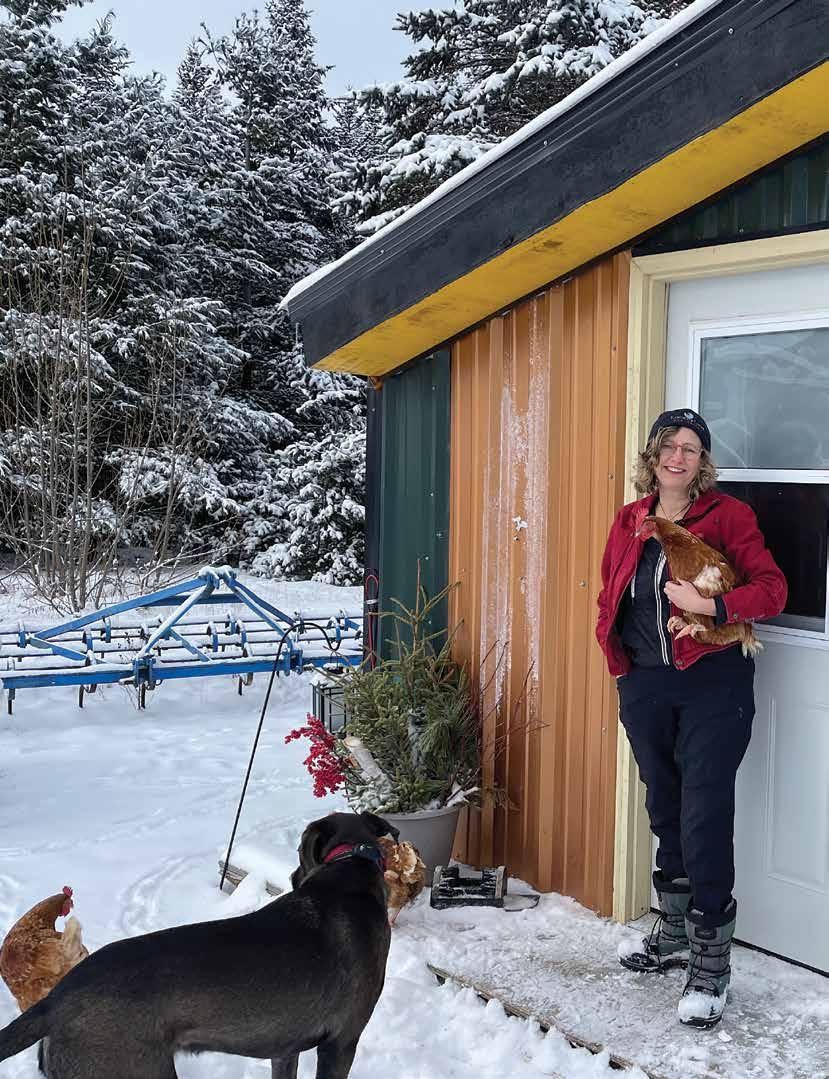 By Janna Goerdt
By Janna Goerdt
Lucie
PHOTOS COURTESY OF LUCIE AMUNDSEN
~
Amundsen ~

Lucie Amundsen insists that there’s no secret to the busy and varied lifestyle she leads.
Wife, mother of two, communications director at the Duluth Entertainment Convention Center, author, educator, volunteer, marketer, public speaker, advocate — and mother to about 800 free-range laying hens. How does Amundsen do it all without cracking?
“There’s no magic at all,” Amundsen said. “Like anyone else, I plod my way through.”
One might wonder though.
Did she need to write a best-selling memoir about how she and her husband, Jason, started an egg farm named Locally Laid from scratch? Did they need to add 14 acres of you-pick fruit? And then an Airbnb that’s two-thirds sleeping accommodations and one-third chicken coop? Does she need to mentor a classroom of farmers on how to write their own farm stories? And all this while holding down one full-time job and still working on the farm?

Yes. Yes, she did.
Now that Locally Laid is on more stable footing, more than a decade after the Amundsens jumped feet-first into the unknown world of agriculture (they went from a backyard flock of five hens to procuring land enough to let thousands of layers roam on pasture), Lucie has a little more time to spend on the jobs she finds most satisfying.
That includes writing, marketing her entrepreneurial ventures, advocating for farms and local businesses, and helping other farmers tell their own stories.
“I love taking a classroom of farmers who are utterly convinced that they have nothing to offer the world storywise,” Amundsen said, “and a few weeks later, they send me an article they wrote about their farm and the unique things they are doing. What a joyous thing, to help them see themselves differently.”
Amundsen did the same for her family farm, beginning with their farm name. The farm is registered as Amundsen Farms (yawn), but it does business as the utterly memorable Locally Laid Egg Company, which, of course, led to the tagline “Get Locally Laid.”
In 2016, Amundsen published a farm memoir that earned national attention, and cemented their regional reputation as a farm. For the full, nitty-gritty story of how the Amundsens got Locally Laid Egg Company off the ground, pick up “Locally Laid: How We Built a Plucky, Industry-Changing Egg Farm From Scratch.” Spoiler alert: They made a lot of mistakes before finding their way through the maze of regulations and general agricultural obstacles.
THEWOMANTODAY.COM 7
Continued on page 8
Lucie Amundsen, co-owner of Locally Laid Egg Company, is pictured in front of "The Coop," an Airbnb — or AirB-n-Bawk! — where guests can spend the night and share sleeping quarters with a few of the Locally Laid chickens.
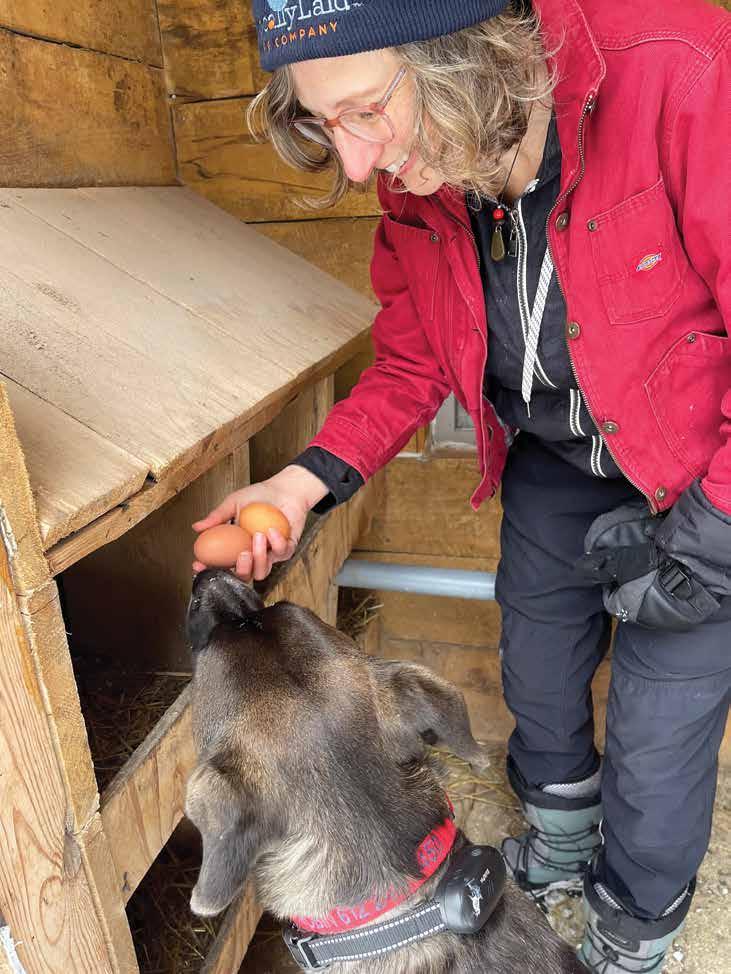
8 March 2024
Lucie Amundsen is not only the co-owner of a local, pasture-raised egg company that maintains several thousand hens, but she is also the communications director at the Duluth Entertainment Convention Center, as well as an author, mentor and advocate for local, sustainable businesses.
During conversations, Amundsen frequently reveals her dry wit and sense of humor about the adventures and misadventures of farming.
For instance: Reading her memoir is “farm contraception,” she said.
And, of watching some of their first flocks of Rhode Island Red laying hens, a breed that turned out to be a little too aggressive to keep as a large flock: “I’ve seen things I cannot unsee,” she said. Today, the Amundsens raise a gentler breed called Hy-Line Browns.
The Amundsens often bring a representative chicken to area events, such as the Lake Superior Harvest Festival, or, this holiday season, the Duluth Winter Village. It’s a chance for people to get up close and personal with a Locally Laid chicken — all of whom are named LoLa (for LOcally LAid).
How does the traveling LoLa get chosen?
Continued on page 10






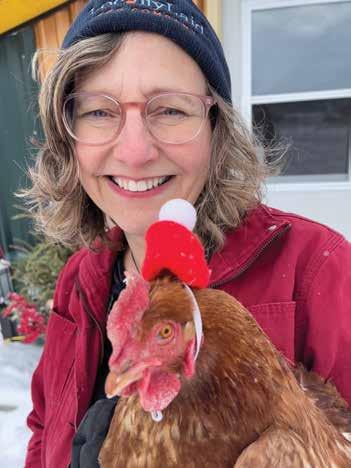






THEWOMANTODAY.COM 9
www.campbelllumber.com 3107 Tower Ave. • Superior • 715-394-7721 facebook.com/campbelllumber BUILT TO LAST Hours: M-F 8-5:30 • SAT. 8-3 ·Trex ·Azek ·Timber-Tech Decking IT’S TIME TO UPGRADE YOUR DECK RAILINGS THIS SUMMER. CHECK OUT ALL OF THE OPTIONS. TUSCANY RAILINGS STOCKED IN BLACK AND BRONZE! DRINK RAIL OPTION AVAILABLE. Hours: M-F 8-5:30 • SAT. 8-3 3107 Tower Ave. • Superior • 715-394-7721 facebook.com/campbelllumber www.campbelllumber.com
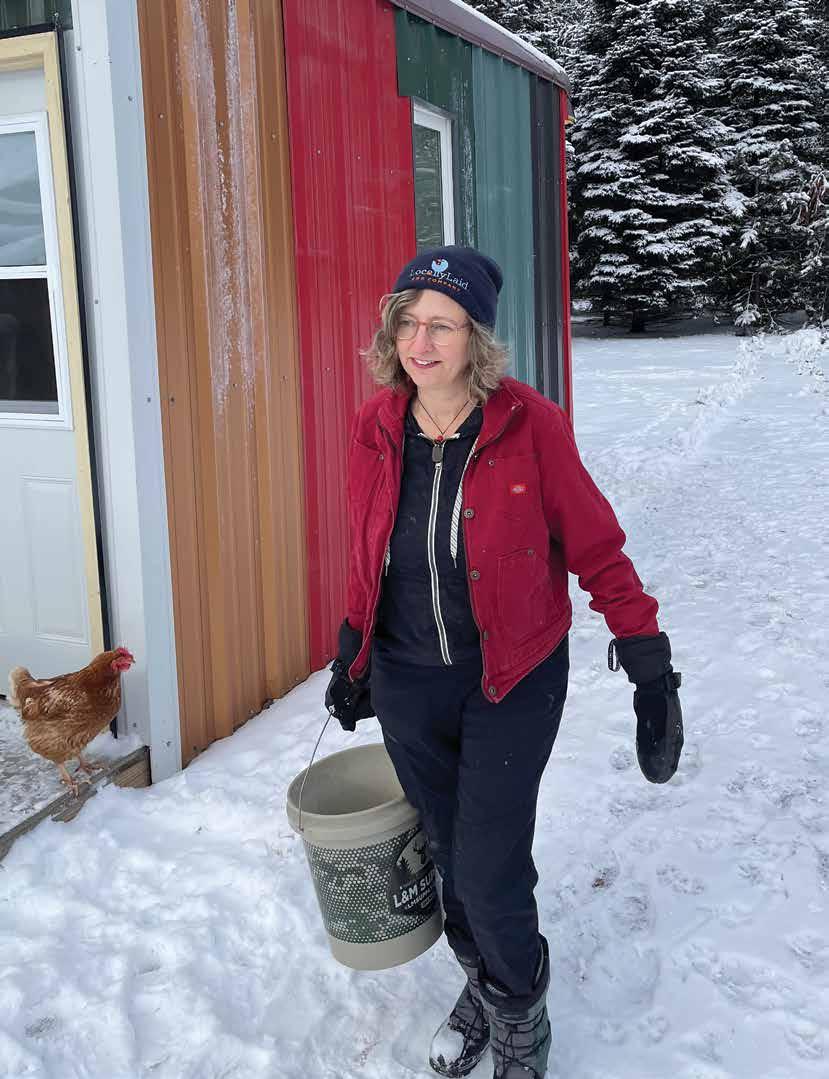
Lucie Amundsen said she never aspired to be an egg farmer, but the company she and her husband, Jason, built has endured many ups and downs and is still going strong. The Amundsens have recently diversified their farm in Wrenshall to include 14 acres of fruit and several Airbnb options.
popular, and is heavily booked even into the winter, Lucie said.
“People are charmed and wowed, and taken with it all,” she said. “It makes you remember that what you are doing is charming, and something to be taken with.”
community, the community that got behind a silly chicken farm,” Lucie Amundsen said. ✤
“Whoever is the slowest,” Lucie said.
Lucie’s farm work these days mostly happens on the weekends. Jason, the Locally Laid farm manager, and a small team of seasonal employees do most of the physical work on the farm during the summer, when the ladies are laying locally, and the strawberries, honeyberries and blueberries are ripening.
Part of the Locally Laid mission is to help build and support mid-sized farms that can pay their owners and workers a living wage. In addition to their chickens, Locally Laid has started purchasing eggs from eight additional farms in Pine County and distributing them through the Locally Laid network. That helps keep the product — and the profits — local, as these egg farms can afford to hire local help to produce a high-quality local resource: delicious eggs from happy hens.
“We are about providing vitality to rural farmers,” Amundsen said.
And partly to help keep their farm venture vital and thriving, Amundsen dreamed up a new venture: AirB-nBawk!
It’s a blend of Airbnb and agritourism, where visitors who want to sample a bit of farm life stay and often do simple chores on a farm. That’s an option on the Locally Laid farm, but you could also stay in “The Roost,” which is a tiny building that’s two-thirds guest room, one-third chicken coop, with a pane of glass in between. Initially, Jason was reluctant to add this offering to their farm, but Lucie pushed for it. So far, AirB-n-Bawk! has been wildly
As her children have grown and moved on with their lives, and the work at Locally Laid has settled into a groove, Amundsen has started thinking about making more time in her life for recreational activities. She used to enjoy long-distance biking, and the pace of exploring a new location “at 13 mph,” carrying with you everything you’ll need on your trip, Amundsen said. She is hoping to pick up that hobby again. And she would like to train their mountain cur farm dog as a therapy dog, if she can find the time.
“I’m really lucky that I have a spouse and working partner who does so much of the farm work,” Lucie said. “It frees me up to work off the farm, at the DECC, where I also have extremely supportive colleagues. There is a safety net of support under me.”
The Amundsens also feel the Duluth-area community has been a consistent safety net, where people are willing to pay a higher price per dozen for eggs raised responsibly.
“We feel really beholden to this



THEWOMANTODAY.COM 11
Janna Goerdt is an Iron Range farmer and freelance writer. duluthedison.org Appointments thatfitmyschedule BlueStone nearUMD 218-606-1040 Downtown Duluth 218-722-3679 Hermantown 218-722-7770 Weprovideflexiblehours,personalized careand98%patientsatisfaction atthreeconvenientlocationsnearyou. Scheduleyourappointmenttoday!
UMD grad student strives to expand opportunities for women in her native India
 By Noah Beardslee
By Noah Beardslee
PHOTOS COURTESY OF FOUZIA BHAT AND NOAH BEARDLSEE
~
~ Fouzia Bhat
Fouzia Bhat takes a break while ascending from Lidwas in Zabarwan range in Kashmir.
Before the final women-only swim lesson of the fall term, Fouzia Bhat leaped into the University of Minnesota Duluth pool. Using a breaststroke, the grad student swam lap after lap. Though she didn't even know how to float just two years before, she now helps teach new students how to swim and has learned every water sport UMD has to offer.
Bhat, originally from Kashmir in India, is pursuing a degree in environmental education. Her passion for all things outdoors and expanding opportunities for women led her to the United States, and Bhat wants to bring everything she’s learned back home.
Following her passions
Bhat has a strong connection to her home Kashmir. Its alpine lakes and the Himalayas always had a particular pull on her.
“I didn’t want to stay inside the four walls of the room or my house at all,” she said. “Being a male-dominant society, women usually, like while I was growing up, didn’t have those opportunities to go out.”
But that didn’t stop Bhat. Her insistence on going on trails, despite the objections of men, began in 2012 when her older brother was supposed to go on a school-arranged hike just for boys. She begged him to take her anyway, and he caved. To guilt the organizers into letting her go, he told her to cry whenever they questioned her.
The siblings’ plan succeeded, and she got to hike to an alpine lake. Between the beauty of her surroundings and pushing her physical limits, Bhat said, “The feel I got while I was climbing, it was like, ‘Oh my God, this feels so good.’” She was hooked.
When it came time to choose a major, Bhat looked at what would keep her outdoors. After completing a degree in tourism management, her new job with a tourism company took her out of her hometown of Srinagar for the first time.
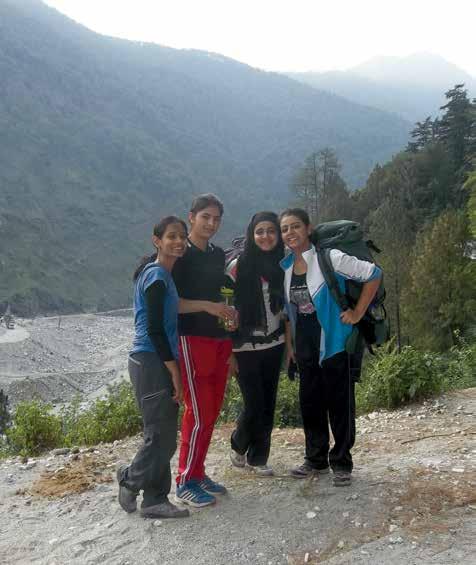



Continued on page 14
THEWOMANTODAY.COM 13
Fouzia Bhat, second from right, is shown with her teammates from India during basic mountaineering training in May/June 2015 in Uttrakhand, India.
• Environmental Education integrated throughout the curriculum • Art, Music, PE, and Environmental Ed Specialists • Small Class Sizes • Busing from Duluth and Two Harbors Kids First * Knowledge * Stewardship * Partnership 5926 Ryan Road ~ Duluth, MN 55804 218-525-0663 x100 Nestled on 40 acres with a 20-acre school forest, a greenhouse, an orchard and outdoor classrooms. Nature based school serving students Pre-K - 6th Grade Northshorecommunityschool.org
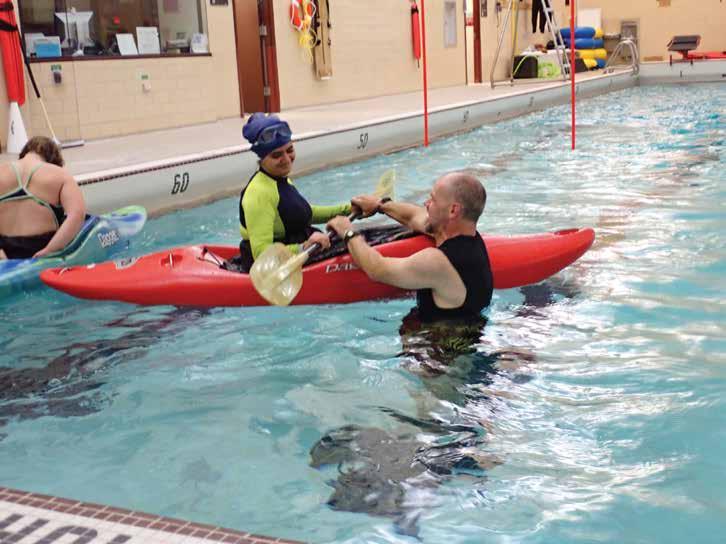
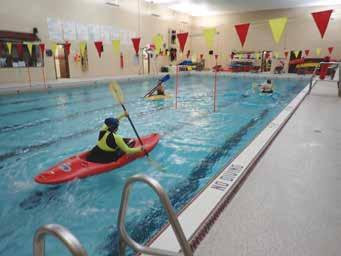
At first, she had explored each Indian state in her mind and with Google to the point she could quickly create itineraries for her clients. But soon she was able to explore them for real.
“Within a one-and-a-half-year span, I got a chance to travel almost to each Indian state, which was like so good and I liked it,” Bhat said.
While working with international clients, Bhat was impressed by their use of reusable water bottles. This stood in contrast with an experience she had with fellow hikers when one threw a wrapper on a trail, and when she challenged him, he said it didn’t matter.
“So I was like, no, there is a need of changing this mindset in people,” Bhat said.
She believed she could make a difference. So she looked at master's programs abroad.
The COVID-19 pandemic set Bhat’s plans back two years since she wanted to do classes in person. She didn’t want to
wait another year and 2022 was fast approaching. When UMD offered her a place in the spring term, she jumped at the chance.
But there was one other thing Bhat required. Swimming. She grew up seeing boys go kayaking.
“I said, ‘I want to do it, too, but if I drown who’s going to save me?’”
With all the different water sports UMD offers, Bhat was sold, but knew she needed to get the swimming skill under her belt first.
She was scared when she first started.
“We as youngsters, while I was growing up, we were never taught about like, ‘OK you can swim in the water; there is a lake, just go into it.’ It was always like, ‘No, keep away from it. You can drown,’” Bhat said.
Continued on page 15-17
14 March 2024
Fouzia Bhat masters the art of kayaking at an Intro to River Kayaking class led by instructor Randall Carlson at the University of Minnesota Duluth.
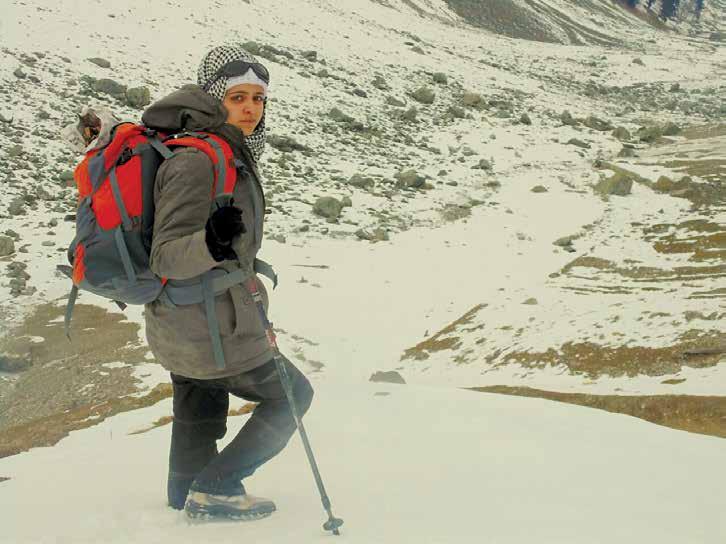
Fouzia Bhat is part of a group picture taken just before heading to summit Draupadi Ka Danda-II in June 2016.
BU SI NE SS BA NK


G


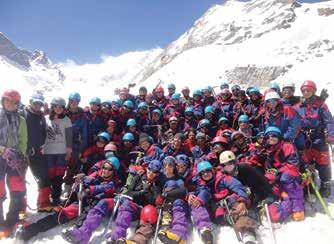


THEWOMANTODAY.COM 15
Fouzia Bhat descends down from winter trek to Marchoi in Kashmir Himalayas.
IN
HERMANT OW N | 218.415.7130 DULUTH | 218.673.5050 Fr andsenBank .com
r CA013123
JODI MAY VP /Busine ss Ban
ke
r
SBAPreferred Lender 218-491-1459
STACEY
JOHNSON
VP /Busine ss Ban ke
BANK
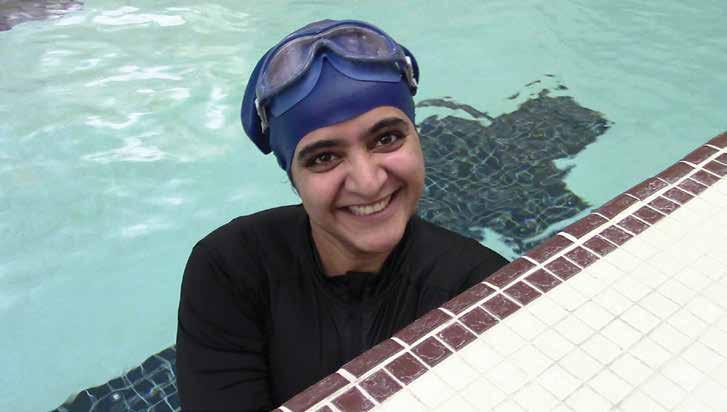
When she started her first lessons in spring 2022, she insisted her instructor stay by her side. She didn't want to be alone in the water. But eventually, she learned.
“When I jump off the pool today, I feel like: How stupid was I? It’s not that scary. You literally can take care of yourself in the water so it’s not that scary,” she said between bouts of laughter.
Now that she knew how to swim, it was off to the races. Paddleboarding, surfing, kayaking. She did it all — every water sport UMD offers. “It gets you hooked up once you know it. It’s like, no, I want to try it. No matter how hard I fail, I want to try it.”
Her leadership
Beyond her own goals, Bhat has the needs of women front of mind. She suggested the need for women-only swim lessons at UMD, and such lessons were established in the fall term of 2023. She also became active with Recreational Sports Outdoor Program where she helped plan and lead trips, and she even earned the Ken Gilbertson Leadership Award.
With graduation from the master's program in sight, her next task is to start her doctorate. Bhat wants to study how turmoil affects people's mindsets when it comes to sustainability.
“I have a lived experience of living in a turmoil-affected

place, so I know sustainability is not even in our minds at all. All we think is what is going to happen tomorrow,” Bhat said.
The region of Kashmir, called Jammu and Kashmir, is disputed between India and Pakistan. The dispute, as well as a movement for Kashmiri independence, goes back to the British withdrawal from the region in 1947. Periods of war, insurgency and crackdown on dissent ensued over the decades according to a BBC profile of Kashmir published December 2023. That month, India’s supreme court upheld the 2019 stripping of Jammu and Kashmir’s special status as a semi-autonomous region, according to the Associated Press.
She is figuring out how to teach with a lighter touch and thinks she can make a snowball effect.
“If I teach one person, maybe he teaches another person and that’s how it rolls,” she said.
Aside from sustainability, Bhat wants to improve the welfare of women back home who lack the opportunities to go out or even, because of the political situation, feel unsafe.
“It’s not just swimming. It’s like, all the outdoor activities
16 March 2024
Fouzia Bhat, who grew up fearing the water, learns to swim during a class at the University of Minnesota Duluth, which boosted her confidence to explore kayaking and other water sports.
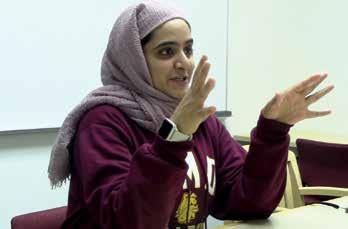
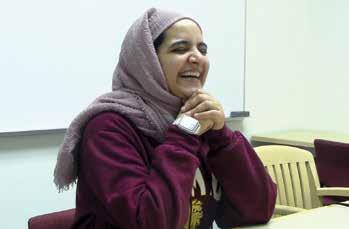

that women do here I would want to take all those back home so that women know there are (many) more things to do than just being in the four walls of their rooms,” Bhat said.
Even before she came to the U.S. Bhat looked for ways to include women in outdoor life. She once organized an allwomen trek.
“It was a summer festival for Jammu and Kashmir government and I told them, ‘Why don’t you announce an allwomen trek to an alpine lake for a day?’ And we saw the participation of 38 women,” she said. “And that was the change I wanted.”
Advice to women
When asked what advice she would give to women, she began with encouragement for Kashmiri women.
“At least once in a life try to go out of your comfort zone and see how contented you feel with yourself and see there’s a beautiful world waiting for you to explore, to enjoy, to live in.”
And for American women, Bhat offered a call for gratitude.
“Be appreciative of all the opportunities you have here, because down somewhere in any part of the world there are women who suffer to just get out of their houses.” ✤ Noah


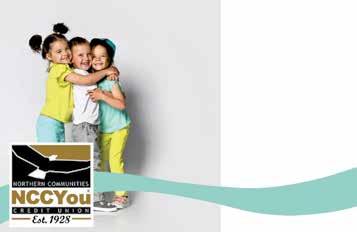



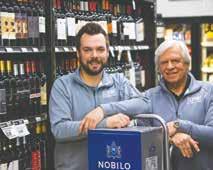








THEWOMANTODAY.COM 17 C L O Q U E T ( 2 1 8 ) 8 7 9 - 4 6 6 3 H E R M A N T O W N ( 2 1 8 ) 7 2 9 - 6 7 9 1 S U P E R I O R ( 7 1 5 ) 7 1 8 - 5 9 0 0 RELIABLEMN.COM PROTECTING YOUR HOME TO GIVE YOU PEACE OF MIND youth accounts financial education think your
Sm
www.nccyou.com
is a Duluth freelance writer. Voted Best Liquor Store & Wine Selection in the Duluth News Tribune’s 2023 Best of the Best Contest KEYPORTLIQUORS.COM 1900 Belknap, Superior 715.392.5855 2023 BEST BEST OF THE Fouzia Bhat
Beardslee
~ Rebecca Brown ~
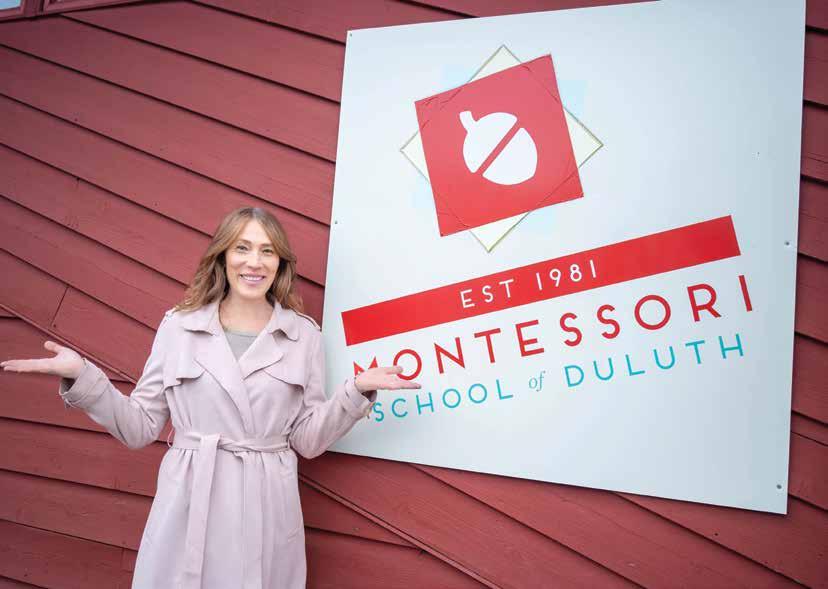 By Andrea Busche
By Andrea Busche
New leader at Montessori School transitions from WILDERNESS CLASSROOM
to
AMontessori education is quite different from the standard public school experience. The Montessori method, which was founded in 1907 by Italian physician Dr. Maria Montessori, emphasizes learning through all five senses.
Children in Montessori classes learn at their own pace and according to their own choice of activities. Montessori schools
exist all over the globe, including in Duluth.
In November 2023, Rebecca Brown became the head of school at Montessori School of Duluth (MSD), located at 313 Mygatt Ave. Her prior career history — including several years as an outdoor adventure guide — is unique, individualized and interesting; somewhat similar to the Montessori method itself.
18 March 2024
PHOTOS COURTESY OF REBECCA BROWN AND MISSY RAE
Rebecca Brown recently joined the team as head of school at Montessori School of Duluth.
Brown was introduced to the Montessori method while searching for the highest-quality early childhood education possible for her son, Chama (named for the Rio Chama in New Mexico), who is now 21.
“I was immediately drawn to Montessori philosophy because it encourages independence through the specially prepared environment,” she said. “Each student discovers their strengths in safe, beautiful and orderly surroundings. The engaging materials spark curiosity and empower students to learn on their own terms, which is what I wanted for my own child.”
Childhood
Brown is originally from Wyoming, Minnesota. Her mother, Concha Duran-Brown, was a nurse anesthetist. Her late father, Ray Brown, was a farmer and volunteer firefighter. The family — including Brown and her two siblings — later relocated to the “big city,” and she attended high school in Roseville.
“We got to drive the tractor and help out in the fields,” she noted about her early life in the country. “We hung laundry and spent a lot of time outside. Looking back, it’s very idyllic. But at the time it was just chores.”
In her youth, Brown stayed active in sports. She was a competitive ice skater and also played soccer. She worked as a lifeguard at the YMCA.
She also had a bit of an adventurous streak. While in high school, she traveled to Austria as an exchange student. Right after graduation, she spent a year in Venezuela.
“It was then that I knew my life would be full of adventure,” she said. “I loved the feeling of being able to recreate my identity. There were so many new opportunities to explore different ways of being. The food, culture and customs were just pure excitement to me.”
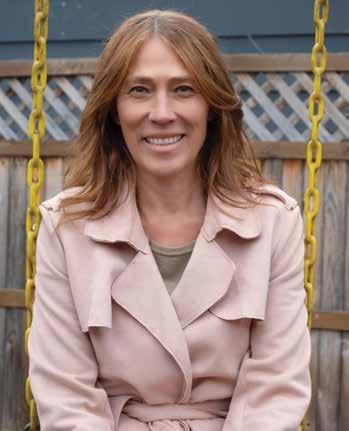
There is a seamless connection between the outdoor and indoor environments at Montessori School of Duluth, where Rebecca Brown is the new head of school.
Education and adventure
Interestingly, she met her best friend, Dr. LJ Geiken, who was from Oregon, on that high school Austrian trip. Brown’s
Continued on page 20

THEWOMANTODAY.COM 19
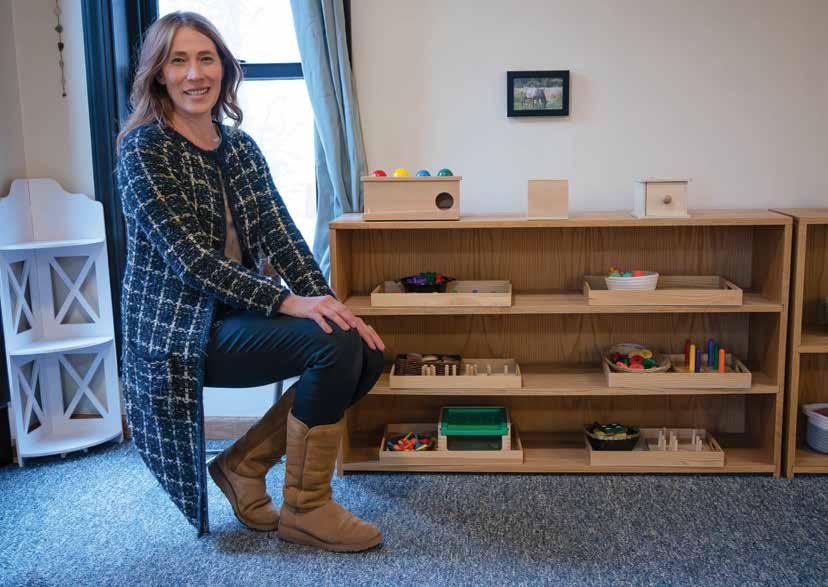
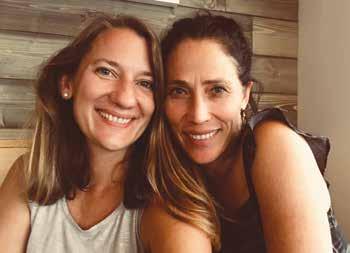
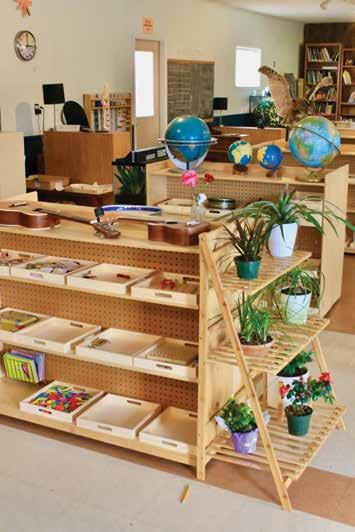
20 March 2024
Rebecca Brown says Montessori’s prepared environments are carefully curated spaces.
Rebecca Brown and Dr. LJ Geiken have been best friends since meeting as exchange students in Austria.
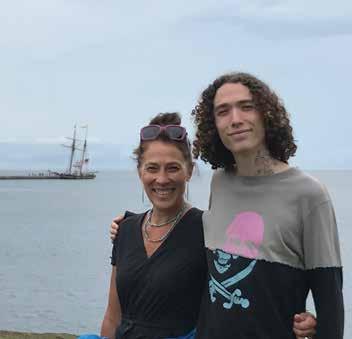
decision to attend college in Oregon — at Southern Oregon University — was because of her friend.
During the summers while attending college, Brown always returned to Minnesota. She was hired as a canoe guide for Camp Menogyn, a YMCA camp in the Boundary Waters Canoe Area Wilderness.
“I didn’t have any experience canoeing,” she noted with a chuckle. “It was just a stroke of luck that ended up changing my life forever.”
Brown originally thought she’d become a translator, so she earned her Bachelor of Arts degree in communications. But life had other plans.
She met Chama’s father while working as an adventure guide in Colorado. Later, her adventure and raft-guiding work took her to places like Nepal, New Zealand and the Virgin Islands. When Chama was a toddler, Brown decided to move back to Minnesota to give her son more stability and family support.
Brown became interested in the Montessori method when she was exploring options for Chama. Ultimately, she decided to pursue it as a career for herself.
“I observed in a Montessori classroom, and immediately had a sense of peace,” she said. “The children were happy and their interactions were so respectful.”
Brown holds AMI elementary and primary diplomas from the Montessori Center of Minnesota in the Twin Cities, and is also an approved expert trainer through Develop. She later
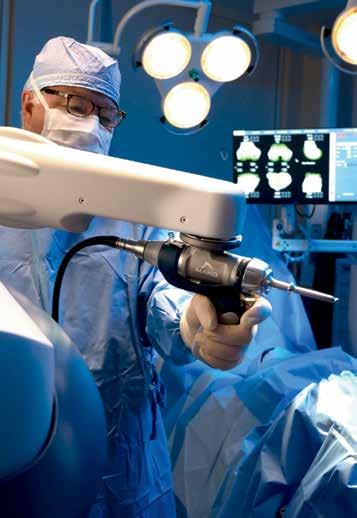
Continued on page 22
THEWOMANTODAY.COM 21
Innovative Technolog y in the Hands of Exceptional Surgeons. It ’ s Your Health, It ’ s Your Choice. Lakewalk.com
Rebecca Brown and her son, Chama Brown, enjoy the Tall Ship Festival in Two Harbors.
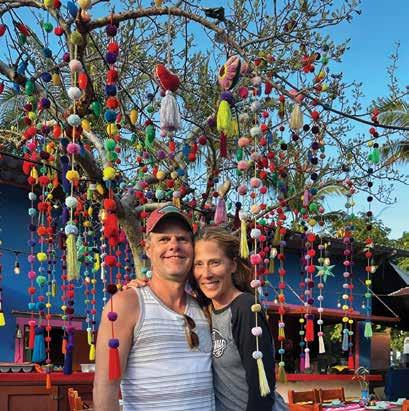

earned a master’s degree in education from Loyola University.
Brown and her son relocated to Duluth in 2019, and she initially worked as program director for Renaissance Schools. She began her role as head of school at Montessori School of Duluth in November 2023.
In this job, Brown’s role is similar to that of a principal. In addition to upholding Montessori principles at the school, she handles professional development with staff members and helps create more awareness and exposure for the program.
Personal
Brown lives in Two Harbors and commutes to work in Duluth. Her partner, Elroy Johnson, is a tax preparer and accountant who owns AccuCountants in Duluth. The family also includes a dog, Sage, whom Johnson rescued in New Mexico.
In her spare time, Brown enjoys outdoor activities such as hiking, canoeing, paddleboarding and windsurfing. She also loves to travel; she recently visited Mexico during the 2023 winter holiday season.
Rewarding work
Brown loves her work in education, particularly using the Montessori method. It has also provided plenty of helpful tools for raising her child.
“To me, Montessori is a peace movement,” she said. “Dr. Montessori loved children so much that she devoted her life to them. I think of her as a genius. She always said, ‘Look to the children; don’t look to me. We observe and respond to what the children are showing us.’
“I’m really indebted to the Montessori method,” Brown added. “I enjoyed raising my son so much, and I’m not sure what kind of parent I’d be if not for the Montessori method. To me, the most rewarding part of my work is watching children work their conflicts out peacefully. Giving them the tools, blueprint, support and encouragement that they’ll continue to use into adulthood — it really is amazing.” ✤
Andrea Busche is a Duluth-based freelance writer and small business owner. She has been a frequent contributor to The Woman Today since 2008.
22 March 2024
Rebecca Brown enjoys hiking with her partner, Elroy Johnson, and his dog Sage.
Elroy Johnson and Rebecca Brown’s travels take them to colorful destinations.
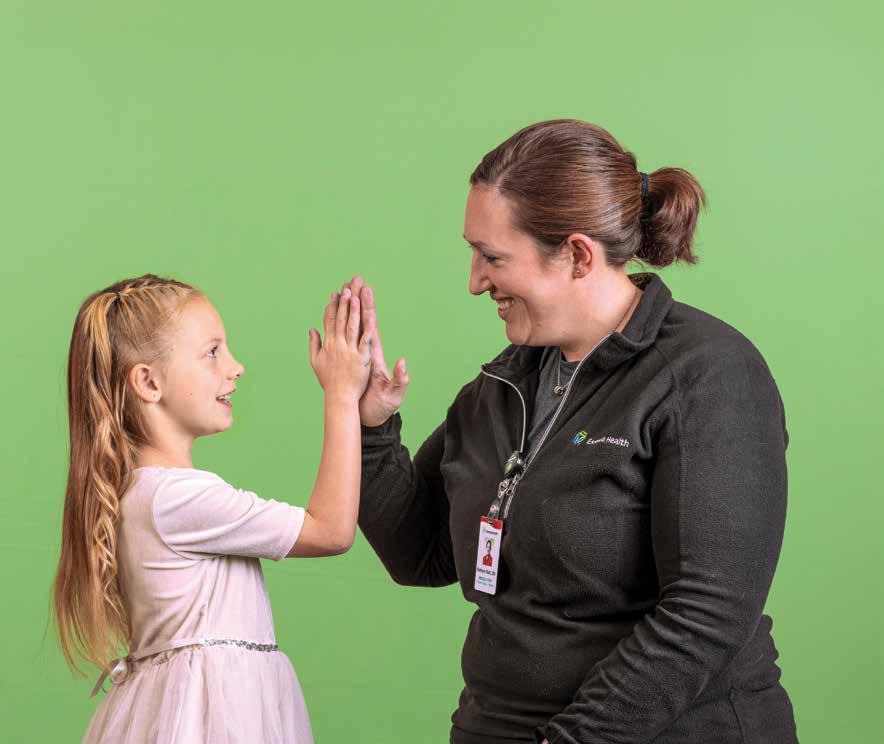
Frominjuriestojointreplacements,weofferthemost comprehensiverangeofspecialtycareintheregion.
Hand&Wrist
Elbow&Shoulder
Foot&Ankle
JointReplacement
MedicalOrthopedics
OrthopedicOncology
PediatricOrthopedics
SportsMedicine 24/7TraumaOrthopedicCare
ORTHOPEDICSFOCUSEDONYOU
ScheduleonlineCall218-786-3520
Joinourteam: EssentiaCareers.org
EssentiaHealth.org/NorthlandOrtho
THEWOMANTODAY.COM 23
Makiyah: Activekid Brokenbone
We fixedmy arm.
Kathryn Huff,DO Pediatric specialist
Instructional Leader of the Year honor highlights
Hintzman
‘SUPERIOR’
as a educator
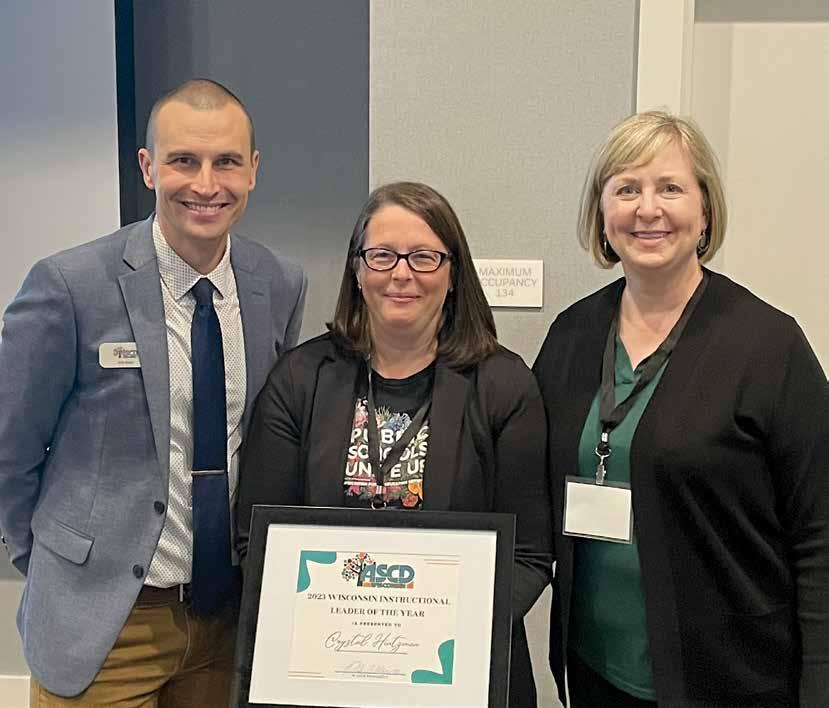 By Andrea Busche
By Andrea Busche
In the hierarchy of public education, former teachers often make excellent administrators. Superior resident Crystal Hintzman is one notable example.
Before her current role as director of curriculum and instruction for the School District of Superior, she worked as a teacher and also as an instructional coach. Many of her colleagues have long viewed Hintzman as a talented leader within the district.
She was recently honored for her work when she was named
Crystal Hintzman, center, received her award from Wisconsin Association of Supervision and Curriculum Development (WASCD) Board President Rob Meyer and Communication Committee Chair Ann Franke.
“Instructional Leader of the Year” by the Wisconsin Association of Supervision and Curriculum Development (WASCD). The ceremony took place Oct. 19, 2023, at WASCD’s fall conference in Sun Prairie, Wisconsin. Hintzman was nominated for this prestigious award by several of her
24 March 2024 PHOTOS COURTESY OF DAVID COY
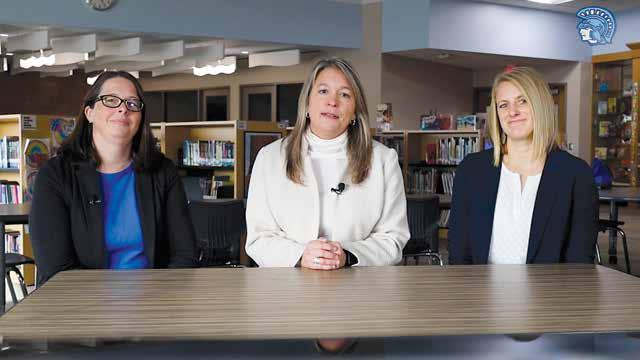
administrative colleagues, including Kate Tesch, director of continuous improvement and assessment for Superior schools.
“This award was a giant surprise,” Hintzman said. “It makes me feel like my work is appreciated by my colleagues and the people I work with every day.”
“Crystal is truly an exceptional leader,” said Dr. Amy Starzecki, district administrator for the School District of Superior. “She’s a terrific teacher, role model and asset to this district. Crystal is proud to be a lifelong Spartan, and the decisions she makes are always grounded in what is best for our students. This award is confirmation of her contribution to our district, ensuring we provide a great quality of education. We are so proud of her.”
Youth
Growing up in rural Poplar, Wisconsin, it was almost a foregone conclusion that Hintzman would work in education someday. Her grandmother, Joyce Coleman, was a first grade teacher for the School District of Superior.
“I’d visit her classroom, and help her clean and prepare,” Hintzman said. “She was a huge influence on me.”
Hintzman’s mother, Sherry Amys, worked in education, too, as a paraprofessional for Superior schools.
Hintzman has three siblings who all work in education. And, interestingly, two of them are married to teachers, too. Her father, Gary Amys, was the only outlier; he spent his career working
for the railroad.
So, when choosing a career path, her decision was clear. In addition to her family’s impressive contributions to education, “I knew I wanted to live in the area and have a family someday,” Hintzman said. “And choosing a career in education would ‘fill my bucket’ in terms of making a difference in the community.”
As a teen, Hintzman stayed busy with student leadership — including serving as class president — along with civic organizations, band, student council, community service, and in athletics as a cheerleader and dancer. She also worked part time at a convenience store and at Smithy’s Supper Club in Solon Springs.
After graduating from Northwestern High School in 1994, she enrolled at the University of Wisconsin-Superior. She graduated with a Bachelor of Science degree in elementary education, with a minor in English and language arts.
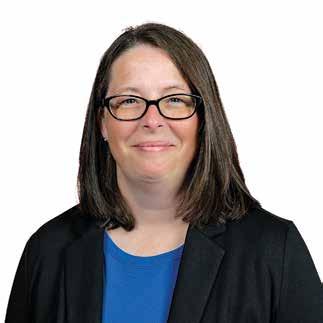
After college graduation, Hintzman was hired as a second grade teacher for the former Blaine Elementary School. Over the next several years, she taught second and, later, first grade at Blaine. She then taught first grade at Northern Lights Elementary. An opportunity arose later to teach fourth grade at Bryant Elementary in Superior’s South End neighborhood. Concurrent with her classroom
Continued on page 26
THEWOMANTODAY.COM 25
Along with District Administrator Dr. Amy Starzecki and Director of Continuous Improvement & Assessment Kate Tesch, Crystal Hintzman explains Wisconsin Act 20 to School District of Superior staff in November 2023.
~ Crystal Hintzman ~
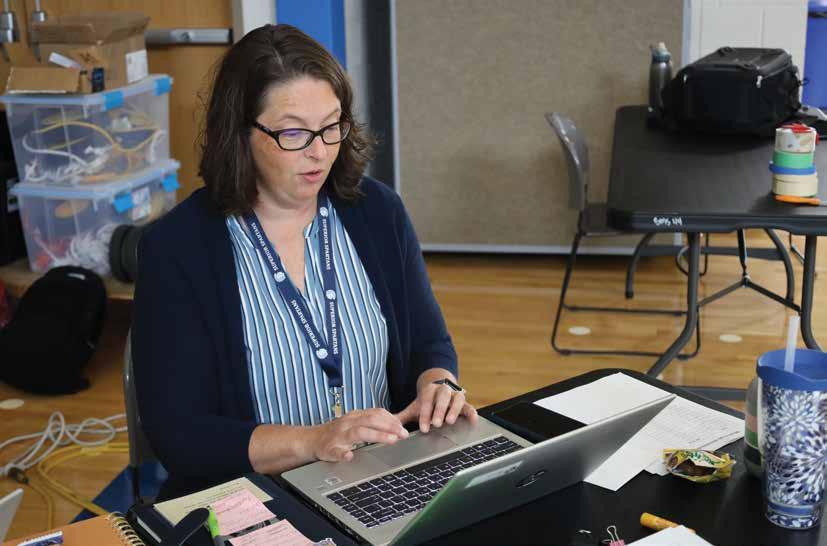
instruction, Hintzman also continued her education. She earned a master’s degree in teaching and learning from St. Mary’s University in 2001.
With extensive classroom experience and her master’s degree in hand, Hintzman was well-prepared for the next opportunity that came knocking.
“The district wanted to hire some instructional coaches in the areas of math and literacy,” she explained. “There were federal funds made available for this program, which was supposed to continue for two years. I was hired to become a math coach. At the end of the two years, the district recognized that these positions were very valuable, and I got to stay in this role for four years total.”
While in this role, Hintzman continued to improve her resume. She earned a licensure in curriculum and instruction, and another in principalship, both through St. Mary’s.
“I knew I’d eventually want another challenge for myself,” she said with a grin.
She applied for her current role and got the job in 2013.
Current role
As a director of curriculum and instruction, Hintzman’s days vary quite a bit.
“My primary charge is to ensure that all students receive access to a guaranteed and viable curriculum and learning
experience in the school district,” she said. “So, if you’re a third grader at Bryant or a third grader at Cooper, you should have the same curriculum taught to you.”
Additionally, she works with principals to ensure teachers are receiving proper support. She also works closely with the district superintendent and other directors. Another task is to observe teachers at work and provide constructive feedback.
Hintzman spends most of her days working from Superior’s schools, which include six elementary schools, a middle school and a high school. She also has an office at the district’s administrative building.
In addition to her work as an administrator, Hintzman maintains several professional affiliations. She is a member of WASCD, as well as the organization’s national branch. She is a member of the Wisconsin State Reading Association. She mentors people working on their curriculum and instruction licensure through the University of Wisconsin-Superior, UWStout and Educate Wisconsin. She also is a past and current presenter at the Wisconsin Association of School Boards’ annual conference.
Personal
Hintzman and her husband, Michael Hintzman — who is a band teacher for Northwestern middle and high schools — live in the Village of Superior. They have two adult children, Elise,
26 March 2024
Crystal Hintzman answers questions and prepares for the next shared leadership presentation in August 2023.
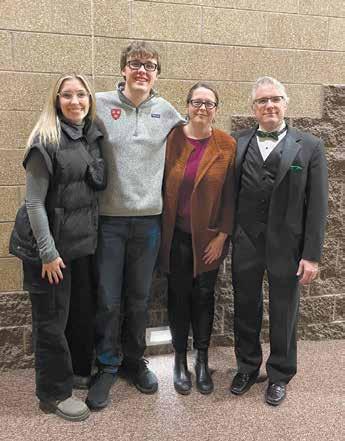

23, who is a teacher for Superior High School, and Ben, 21, who is attending Harvard University in pursuit of a mathematics degree.
In her free time, Hintzman loves spending time at their family cabin in Barnes, Wisconsin. She also enjoys hiking, snowshoeing and visiting state parks.
Future
Looking ahead, Hintzman may consider teaching at the college level someday. But not quite yet.
“I’m not ready to be done in my current role, where I can make the most impact for kids and teachers,” she said. “But I’ve always had an aspiration to teach at the post-secondary level.”
Indeed, she finds her current job abundantly rewarding.
“I love supporting teachers so they can find success in their work with kids,” Hintzman said. “I take my role of supporting teachers very seriously. And it’s also very rewarding to support principals and their leadership teams as they work hard to achieve the goals they have for their schools.” ✤
Andrea Busche is a Duluth-based freelance writer and small-business owner. She has been a frequent contributor to The Woman Today since 2008.

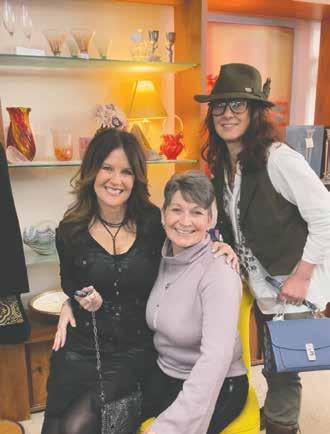


THEWOMANTODAY.COM 27 Casual to Couture for every body and every budget! The Loft Consignment 218.591.2762 · 1709 Mall Drive www.theloftinduluth.com
Following a Maple School District concert, Crystal Hintzman meets with her family, from left, daughter Elise, son Ben, and husband Michael.
PHOTO COURTESY OF CRYSTAL HINTZMAN
Broken but not defeated:
How Essentia Health’s specialty care helped a Duluth girl heal

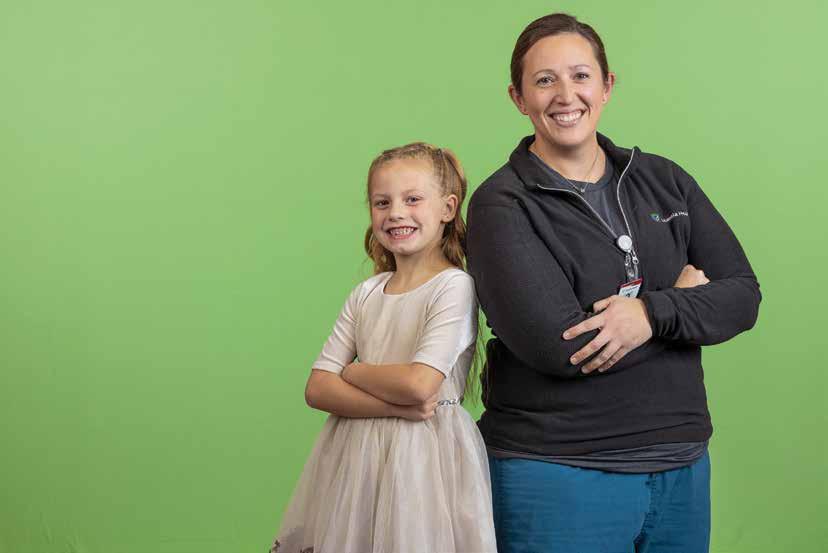 By Anthony Matt
By Anthony Matt
AtEssentia Health, we’re proud to offer pediatric orthopedics, a specialty dedicated to helping children recover from broken bones, ligament tears, scoliosis and other ailments. Our highly trained specialists are well-versed in the nuances of helping children who are still growing.
That’s something 34-year-old Duluth resident Marisa Stevens was especially thankful for when her daughter took a tumble last spring.
Marisa’s daughter, Makiyah Stevens, and Makiyah’s older brother were visiting their grandpa. While playing in the yard, Makiyah fell and broke her arm.
“He called me and said she fell and he knew her arm was broken, and they were going to Essentia Health,” Marisa said.
Marisa met them at Essentia Health-St. Mary’s Medical Center at about 9 p.m. Makiyah, indeed, was diagnosed with a broken arm.
“I was scared for her,” mom said. “But she was a trooper. She wasn’t crying, even though she was in pain. Her only request was that she wanted a green cast.”
At St. Mary’s Medical Center, the Stevens family worked with Dr. Kathryn Huff, one of very few pediatric orthopedic surgeons in the Northland.
“Hearing there was a pediatric doctor on hand made me feel so good,” Marisa said. “I knew Makiyah was going to be well taken care of.”
Dr. Huff worked with mom to make sure all of her questions were answered and her concerns were heard. After waiting for the swelling to go down — among other precautionary measures — it was time for Makiyah to go into surgery.
“Dr. Huff was the calmest person I’ve ever met,” Marisa said. “I’ve never met someone so awesome in my life. She let me know that everything was going to be OK and that she was going to take care of my daughter.”
After about an hour, Dr. Huff let Marisa know the surgery was a complete success.
“Right after the surgery, Dr. Huff came out and showed me a picture of the X-ray,” Marisa said. “It made me feel really good that she herself came out and talked to me about the successful
28 March 2024 HEALTH/MEDICINE SPONSORED CONTENT
COURTESY
ESSENTIA
Makiyah Stevens and Dr. Kathryn Huff, a pediatric orthopedic surgeon at Essentia Health-St. Mary’s Medical Center.
PHOTO
OF
surgery and was there to answer my questions. It’s really nice to hear directly from the doctor in that situation.”
Marisa described the X-ray as nearly perfect. She said Dr. Huff and her team set the break so well that you couldn’t even tell where it happened. With the use of Essentia’s state-of-the-art technology, Dr. Huff was able to use imaging to line the bone up, set it and pin it without making a large incision.
“For many pediatric elbow fractures, we are able to use X-ray imaging technology in the operating room to obtain a reduction and place temporary implants without making any large incisions in the skin,” Dr. Huff said. “In Makiyah’s case, we were able to accomplish this with three small incisions just slightly larger than an IV.”
Makiyah was in a soft cast for about seven days and a hard cast for an additional four weeks. She had several follow-up appointments to make sure she was healing properly. Even though those visits were with different doctors, Marisa said if Dr. Huff saw Makiyah on the schedule, she’d check in to make sure everything was going well.
“Even when we aren’t her patient, if she’s available, she comes in and asks us how things are going,” Marisa said. “Dr. Huff did much more than she needed to and it made me feel like she really cared about us. And it wasn’t just Dr. Huff; everyone was so kind and helpful.”
Added Dr. Huff: “Connecting with patients and their families is crucial to success in the world of pediatric



orthopedics; as surgeons, we have to make sure that we can efficiently and effectively communicate with both the patient and their family to have everyone on the same page and moving toward the same goal of restoring function and returning to activities in a safe manner.”
Several months later, Makiyah, now 7, has returned to doing all the things she loves to do — baseball and soccer as well as playing on monkey bars and trampolines.
It’s nice knowing we have these specialists in Duluth to care for my kids and help them recover from injuries like this,” Marisa said. ✤
Anthony Matt is the media relations specialist at Essentia Health.







THEWOMANTODAY.COM 29 SPONSORED CONTENT
S T Y L E Y O U R S I G H T • Eye Exams • Eyeglasses • Contacts • Billing Your Insurance Direct A p p o i n t m e n t s a v a i l a b l e a t K e n w o o d a n d We s t D u l u t h Vi s i t Vi s i o n P r o O p t i c a l . c o m
7 8TH STREET, CLOQUET•3223 TOWER AVE, SUPERIOR VOTED BEST MEXICAN RESTAURANT 6 YEARS RUNNING! Superior Location Now Open
Arts & Events Calendar
The West Theatre Events
March
Matinee Musicale: Kenny Broberg
7:30 p.m. March 5
We make every effort to ensure the accuracy of this information. However, you should always call ahead to confirm dates, times, location, and other information.
Next to Normal March 15-31

March 7 - The High 48s; March 10 - ISMO: Watch Your Language; March 12Tinsley Ellis: Naked Truth Tour; March 13 - Skerryvore; March 14 - Mallrats Presents: MTV Unplugged; March 21 - Davina and the Vagabonds; March 26 - Mike Zito; March 27John Gorka; March 28 - The Crown Jewels: A Tribute to Queen. Find updated information at thewesttheatre/events.com.
Kenny Broberg, who has worked with some of the world’s most respected conductors and collaborated with numerous prestigious symphonies, will perform at Weber Music Hall. Event includes a free reception with Broberg. Visit matineemusicale.org.

Trackside Jazz
Saturdays in March

The Duluth Playhouse will perform this Pulitzer Prize-winning, contemporary musical that invites audiences into the minds and hearts of the Goodmans, a suburban family struggling with the effects of mental illness. Visit duluthplayhouse.org.
MW5 Survive and Thrive
7 p.m. March 16
Menopause The Musical 2
7:30 p.m. March 6

Every Saturday now through April 27 is Jazz Day at the Duluth Depot. The former Club Saratoga Jazz Quartet performs live at 3 p.m., trackside, in the Lake Superior Railroad Museum. Visit duluthtrains. com/event
Singing with the Stars
6 p.m. March 1
Local celebrities bring their Broadway dreams to life at the Duluth Playhouse. Vote for your favorites, win fantastic prizes, and indulge in a coffee and dessert bar. Visit duluthplayhouse.org.

Emporium Presents: Three Dog Night
6:30 p.m. March 3
Three Dog Night will perform at the DECC’s Symphony Hall with special guest Chris Trapper. Visit decc.org/events-calendar.

Jason Isbell and the 400 Unit
7:30 p.m. March 5
Special guest Palehound will join Jason Isbell and the 400 Unit at the DECC’s Symphony Hall. Visit decc.org/events-calendar.

“Cruising Through ‘The Change’” will be performed at the DECC’s Symphony Hall. Visit decc.org/ events-calendar.

7th Annual Rosie Awards
Thursday, March 7

Presented by The Woman Today magazine, seven women in our communities will be recognized at this annual event at the DECC for Most Engaged Volunteer, Silent Advocate, Leadership Award, Trailblazer Award, Mentor Award and Rosie Award. Visit thewomantoday.com.
Art Night Out
5:30 p.m. March 12
Enjoy British composer Errollyn Wallen, soloists Geneva Lewis and Gabriel Martins performing Brahms, and William Walton’s Symphony No. 1, all at the DECC’s Symphony Hall. Visit dsso.com/concert/survive-thrive.

Sam Hunt
7:30 p.m. March 22
Country music superstar Sam Hunt will perform at Amsoil Arena, with special guests Brett Young and Lily Rose. Visit decc.org/eventscalendar.

Minnesota Ballet: Snow White March 29-30

This Duluth Art Institute social event celebrates the close of two exhibitions — Allison Baker’s “Tender Vignettes: A Class Narrative” and Annelisa Roseen’s “Today I Am.” Gain exclusive insights into the work on view with artist talks, then join the artists in the DAI galleries for a reception. Visit duluthartinstitute.org.
This ballet version of the classic fairy tale Snow White will be performed at the DECC’s Symphony Hall. Choose from three performance times. Visit decc.org/ events-calendar.

Have an event for the Calendar? Submit your event information to: magazines@duluthnews.com at least two months before your event. 30 March 2024

THEWOMANTODAY.COM 31 BROUGHTTOYOUBY *WITHAPPROVEDCREDIT.SEESTOREFORDETAILS 0%APR FOR 12MONTHS ONALLAPPLIANCEPURCHASES * FEATURING 218.722.5803 | 4258HainesRd | JohnsonMertzAppliance.com FAMILYTIME
Empowering patients with genetic counseling
St. Luke's launches new service
By Claire Kiger
“Ialwaysknew I wanted to work in health care,” said St. Luke’s Genetic Counselor Delaney Pease, MS, CGC. “It was during my undergrad studies that I started looking into genetics. Immediately, I was fascinated.”
Genetics are the instructions for how bodies grow and function. These instructions are written in the DNA. Changes, or mutations, in a person’s genetics can cause health problems, like certain cancers or heart rhythm diseases. Genetic counseling is the process of helping people understand how their genetics might impact their health and the health of any children they may have.
“Knowledge is power,” Delaney said. “The data received from genetic testing empowers patients and their providers. I truly believe that genetic testing and counseling are the future of health care.”
Delaney’s journey in genetics
After completing her undergraduate studies, Delaney worked in the genetics laboratory at Mayo Clinic. There, she performed the actual genetic testing.

Although this work was intellectually stimulating, Delaney wanted to work more directly with patients.
“I really loved it,” she said. “But I wanted to be the person who supported patients through the testing process, giving more direct patient care. That’s when I knew genetic counseling was right for me.”
With over two years of experience in the lab, she enrolled at the University of Minnesota to pursue her Master of Science in genetic counseling. Post-graduation, she was thrilled to hear of an opportunity to begin a genetics counseling service in Duluth at St. Luke’s.
“I’m from Duluth,” she said, “so, I am so happy to bring back everything I’ve learned and make a difference in a community I love. Plus, the prospect of starting a brand-
new genetics program at St. Luke’s was incredibly appealing. It was a fresh slate to build something that is truly meaningful to me and will be beneficial to so many.”
What to expect during the process
Genetic counseling at St. Luke’s begins with a one-hour consultation. During this time, Delaney talks with patients about their genetics and health, exploring their personal and family history. This holistic approach enables her to identify crucial health risks unique to their genetic makeup.
Based on that information, Delaney shares available testing options, including their benefits and limitations. She also discusses the impacts of testing and the subsequent potential results. If the patient
32 March 2024 HEALTH/MEDICINE SPONSORED CONTENT
PHOTOS COURTESY OF ST. LUKE’S
Genetic Counselor Delaney Pease, MS, CGC, reviews testing results with a patient.

chooses to move forward with the testing, results typically take a few weeks to receive. Delaney then reviews the results with the patient.
“Medicine isn’t a one-size-fits-all,” Delaney said. “For some patients, genetic counseling can drastically impact what type of health care they receive.”
Genetic counseling at St. Luke’s
In Delaney’s eyes, St. Luke’s is doing more than merely introducing a new service by offering genetics counseling. It’s investing in what truly matters: their patients.
“In a world with rising health care costs and staffing shortages, I’ve been so impressed with St. Luke’s continued dedication to patients,” she said. “Offering this new service shows that this organization is committed to staying ahead in medical science and offering personalized care. I’m proud to be part of a team like that.”
Genetic counseling may be beneficial for a variety of individuals, including those with:
• Family or personal history of cancer.
• Plans to become pregnant or currently pregnant.
• Family history of a known genetic condition.
• Physical differences, especially when paired with other medical issues (unique facial characteristics, birth defects, growth differences).
• Polycystic kidney disease.
• Early-onset diseases that for most people happen later in life (like hearing loss).
• Personal history of multiple uncommon health concerns.
• Moderate to severe intellectual disability.
A referral is not required for this service. Learn more at slhduluth.com/GeneticCounseling. ✤
Claire Kiger is a marketing specialist and writer for St. Luke’s.



THEWOMANTODAY.COM 33 SPONSORED CONTENT
fr y be r ge r.com ° E S TAT E P L A N N I N G L A W ° W hen you want cer t aint y that your a sset s go to T H E R I G H T P E O P L E .

Reaching out to Native-owned contractors, building careers and educating the community
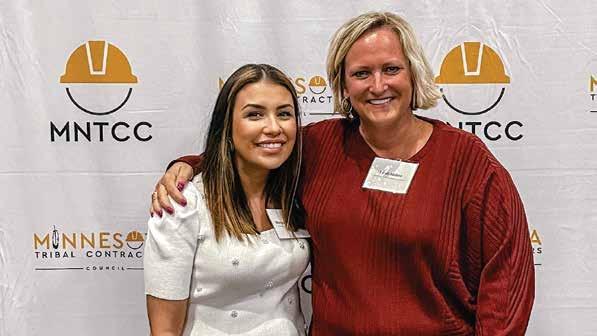 By Janna Goerdt
By Janna Goerdt
Walkinto a Minnesota Tribal Contractors Council event and you can expect to do a lot of networking.
You might not expect to get an education in Native American customs and culture — but you will.
That’s the beauty of the organization, said co-executive directors Morgan Fritzinger and Heidi Holste. Fritzinger is an enrolled member of the Fond du Lac Band of Lake Superior Chippewa, while Holste is non-native and owns a consulting company. Each brings a skill set and perspective to the council that has helped it grow over the last two years.
“I learn every single time I go to an event,” Holste said. “It’s humbling, what we don’t know.”
For the past several years, Fritzinger has been a host of the “Middle of the Rez Road” podcast, which usually features a guest who is involved in the trades, and is intended to spread the word about careers available in construction, iron work and more. The goal of the podcast is to connect Native Americans with career opportunities in the trades.
Creating the podcast fits perfectly with the council’s mission, though Fritzinger was a little shy on experience in leading such an organization. That’s why Jim Jones, the president and creator of the council, decided to hire a co-executive leadership team of a tribal member, Fritzinger, and an experienced consultant with nonprofits, Holste.
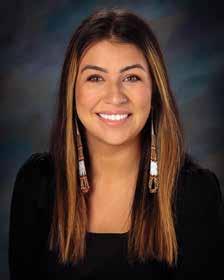
“The job caught my interest because I was already working in this realm of the industry,” Fritzinger said. “I was already
34 March 2024 PHOTOS COURTESY OF MORGAN FRITZINGER
Morgan Fritzinger, left, and Heidi Holste are co-executive directors of the Minnesota Tribal Contractors Council, an organization that represents and gives voice to the needs and concerns of tribally owned businesses.
Morgan Fritzinger
getting the word out about jobs, and cultural teachings, so it was a good fit. And it was a big step for me; I’ve never been in this kind of a role.”
“Morgan brings the community experience,” Holste said. “I make sure we file all our paperwork, have the bylaws, and get our budget done. Morgan does the meat of the work to reach out to the community.”
“I get a lot of companies that reach out to meet with me to see how they can be better at inclusion,” Fritzinger said. “They want to learn more, to understand the culture, to be more sensitive.”
Fritzinger recently had a long discussion with a representative of a large Duluth-based company that provides development services across the country.
“He was genuinely interested in trying to be more sensitive and more knowledgeable. They were looking to do some work on reservations, and I advised that it’s always good to try to employ local Indigenous contractors.”
But it’s not all about large employers. Fritzinger said there is a need for smaller Native-owned contractors, people who develop websites and do marketing.
“We need all these other things that make businesses successful,” she said.
The council’s Facebook page is filled with posts about companies looking to hire, upcoming job training sessions, tidbits from “Middle of the Rez Road” podcasts, and stories of connections made at council networking events.
“If you come to an event and talk to the people that come, they are excited to be there,” Holste said. “They are excited to be inspired, excited to learn. Our speakers have such a wealth of knowledge.”
The council was formed in 2021 by Jones, a member of the Leech Lake Band of Ojibwe who owns a culturally sensitive excavation business, Dirt Divers. In part, he wanted to bridge that gap of Native Americans who were looking for work in the trades, and companies that were interested in hiring a more diverse workforce.
“I was working on the Line 3 decommissioning project, and someone mentioned to me, it was too bad there wasn’t a voice for tribal-owned businesses to speak up,” Jones said.
There were ongoing protests, many led by Indigenous people, over the construction of the Line 3 oil pipeline that cuts across northern Minnesota. Jones wanted people to know that there were also tribally owned businesses that were benefitting from the jobs the pipeline project provided.
“There was another business owner whose equipment got damaged at one of these locations, and I thought it was too bad there wasn’t an organization for them,” Jones said.
The council is now poised for growth.
“The first year people were asking me to expand this, to make it a Midwest Tribal Contractors Council,” Jones said. He declined. He wanted the organization to be on a rock-solid
Continued on page 36


THEWOMANTODAY.COM 35
Morgan Fritzinger is pictured on the steps of the Minnesota state Capitol while attending a "Women in Energy" event.
Morgan Fritzinger, co-executive director of the Minnesota Tribal Contractors Council, is pictured with Joel Boshey, a host from the “Middle of the Rez Road” podcast.

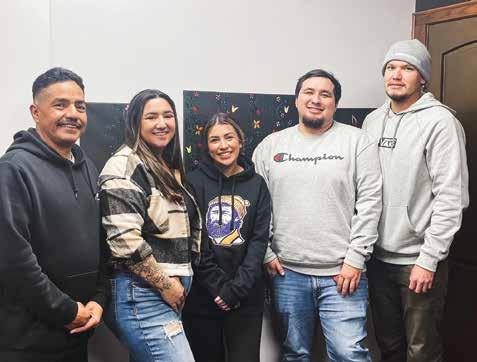
footing before considering any kind of expansion.
Jones also points to the relationship between Holste and Fritzinger as an example of what the council is all about.
“It’s in the spirit of this organization to bring people together,” Jones said. “Here you have a nontribal member who is mentoring (Fritzinger) … and Morgan is gaining experience through that mentorship with Heidi, and it’s helping to empower Morgan.”
There have been requests for the Minnesota Tribal Contractors Council to expand to other states, but for now, Fritzinger said they plan to focus on serving Minnesota.
“There are big projects going on everywhere,” Fritzinger said. “We are going to grow as our members and our membership grows.”
Fritzinger recently joined the Duluth Area Chamber of Commerce as a board
36 March 2024
Heidi Holste, left, and Morgan Fritzinger are pictured at a Minnesota Tribal Contractors Council event. The two women have worked as co-executive directors of the council, though Holste, who also owns a consulting business, is about to step back a bit, and Fritzinger will move more fully into the executive director role.
The crew from the “Middle of the Rez Road” podcast, which Morgan Fritzinger will continue to help create, include, from left, Joel Boshey, Alyssa Abramowski, Morgan Fritzinger, Ricky Reilly and Charlie Smith.
member, and she recently took her 8-year-old son, Kruz, to a Chamber event. Kruz was thrilled to go along, she said. “He’s a little networker.”
The council has expanded its reach into the Twin Cities area. They put on two large events in the metro area in 2023, Fritzinger said, one in conjunction with the American Indian Chamber of Commerce.
“We got a pretty big response,” Fritzinger said. “In the (Twin) Cities, there’s a pretty big presence of Native Americanowned contractors.”
Council members also took part in a roundtable discussion with Native-owned businesses and Minnesota’s Lt. Gov. Peggy Flanagan, who is a citizen of the White Earth Nation.
There is a bit of a change coming to the council’s leadership — Fritzinger will be stepping up a bit, and Holste will be stepping back. That had always been the plan, as Holste continues working with other nonprofits through her consulting company.
As Holste reduces her work with the council, she said she’s leaving it in good hands.
“Morgan sees something that needs to get done, and all of a sudden, it gets done,” Holste said.
For more information about the Minnesota Tribal Contractors Council, visit their website at www.mn-tcc.org ✤
Janna Goerdt is an Iron Range farmer and freelance writer.





THEWOMANTODAY.COM 37 www.keystonebluffs.com • www.diamondwillow.com • (218) 730-8550 HEADQUARTERED IN DULUTH WITH 10 COMMUNITIES TO SERVE YOU BEST! Keystone Bluffs: Duluth Diamond Willow: Lester Park, Cloquet, Proctor, Grand Rapids, Mountain Iron and Central Minnesota Every Person Deserves to be Treated with Dignity and Respect in Every Interaction COMMITMENT: We are committed to providing quality service & care to our clients, through compassionate care completed in an intelligent, outcome based manner. ADAPTABILITY: We will adapt to our situation, to assure that our clients and their needs remain at the forefront of our focus. RESPECT: We will respect those who live with us, work with us, and interact with us. ETHICS: We will carry ourselves in a manner that we can be proud of even when no one is watching. Not only a great place to call home, also a great place to work! NOW HIRING! What Senior C.A.R.E. Means at Diamond Willow & Keystone Bluffs CONTACT Admissions Director Emilie Mahler for a tour today! emahler@diamondwillow.com
Morgan Fritzinger and her children enjoy a fall outing.
BUSINESS PARTNERS BREW CLOSE FRIENDSHIP
Bent Paddle Brewing is 50% woman-owned; 100% family-friendly
By Janna Goerdt
Theywere beer-related acquaintances, then full-time business partners, and then good friends.
Karen Tonnis and Laura Mullen, who make up half of the ownership team at Bent Paddle Brewing Co. in Duluth, are committed to growing the craft-brewing beer business in northern Minnesota, as well as keeping this small (though it has 50 employees), local business alive and thriving.
Having a brewery that’s 50% woman-owned is “incredibly rare in the craft-brewing industry,” Tonnis said. Her husband, Bryon, and Mullen’s husband, Colin, are the other half of the owner partnership.
Laura Mullen recalls going to a craft beer event with a friend in 2005 and finding it to be populated with mostly men. But that is changing. Today, about half of craft beer customers are women, though male brewers and employees still dominate the industry, Mullen said. Emily Vikre, co-founder and CEO of Vikre Distillery, is a notable exception.
Mullen and Tonnis want to see more women working in the
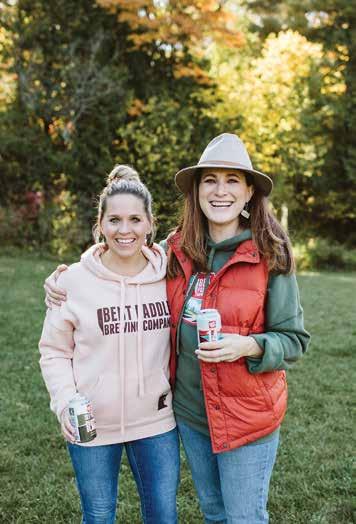
industry. Part of the reason, they say, is that if women are to feel welcome and comfortable visiting places like Bent Paddle, it’s often because other women are making sure that is so.
The duo made sure their new brewpub was family-friendly and committed to evolving in a family-friendly way. If mom and dad both want to have a relaxing time to share a pint, but the brewpub repels children, well, there goes that customer base. When they expanded into a larger space in 2018, the Bent Paddle team added a custom-built kids’ nook with bespoke furniture by Duluth-based Loll Designs and, more recently, an outdoor plaza space with room for kids (and dogs and adults) to roam. Each restroom has a stool so kids can reach the sink to wash their hands.
“It’s normal now, but it wasn’t normal 10 years ago,” Tonnis said.
In general, craft brewers are an inclusive and progressive lot, Mullen said, but connecting with all members of the public helps to bring in a different perspective. That might include the tone you take on social media — Tonnis describes the Bent Paddle social media vibe as “a natural, motherly voice” — or it
PHOTOS COURTESY OF BENT PADDLE BREWING
Karen Tonnis, left, and Laura Mullen, who together own half of Bent Paddle Brewing Co. in Duluth, have spent more than a decade building a solid craft brewery business along with their husbands, Bryon Tonnis and Colin Mullen. The two couples began as business partners and became fast friends.
38 March 2024
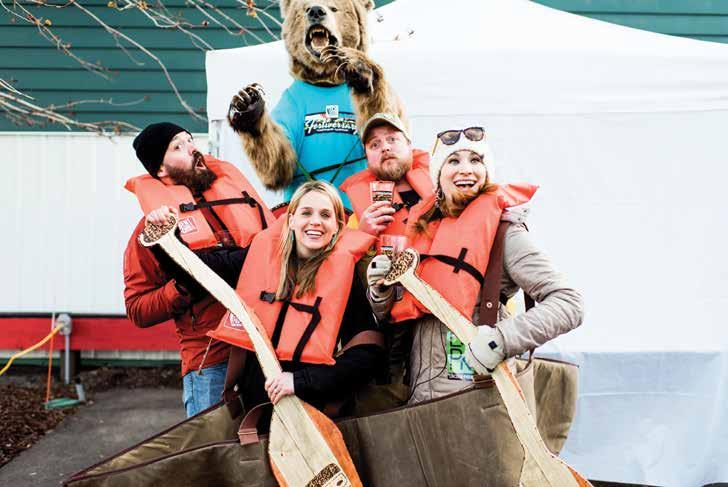
careful and deliberate decisions on how to structure their business to play off each other's strengths.
The number of craft breweries in Minnesota: In 2004: 20
In 2012 (just before Bent Paddle opened): 36 In 2023: 190
might just be putting out a beautiful tablecloth at a beer-tasting event.
“The beer can be great at a brewery, but it can feel cold,” Mullen said.
Tonnis and Mullen raised their children while building Bent Paddle. They both learned they were pregnant when the two couples were still building their business plan. Tonnis and Mullen both came to a dinner meeting planning to reveal that they were expecting — and thinking that the news was going to send everyone into a tailspin. Instead, the two couples carried on together, and Tonnis and Mullen would place their children — who were born just three days apart — into baby carriers and head on out to sales calls.
That was a decade ago. Today, Laura and Karen finish each other’s sentences and communicate with looks and laughs. They get each other.
They were so committed to fine-tuning their long-term partnership that several years after they opened Bent Paddle they hired a business coach for a two-day intensive workshop to ensure all four partners were still in the right spaces.
Bent Paddle Brewing Co. owners, pictured from left, are Bryon Tonnis, Karen Tonnis, Colin Mullen and Laura Mullen. The two couples made
PHOTO COURTESY OF BAILY ARO PHOTOGRAPHY
THEWOMANTODAY.COM 39 Continued on page 40
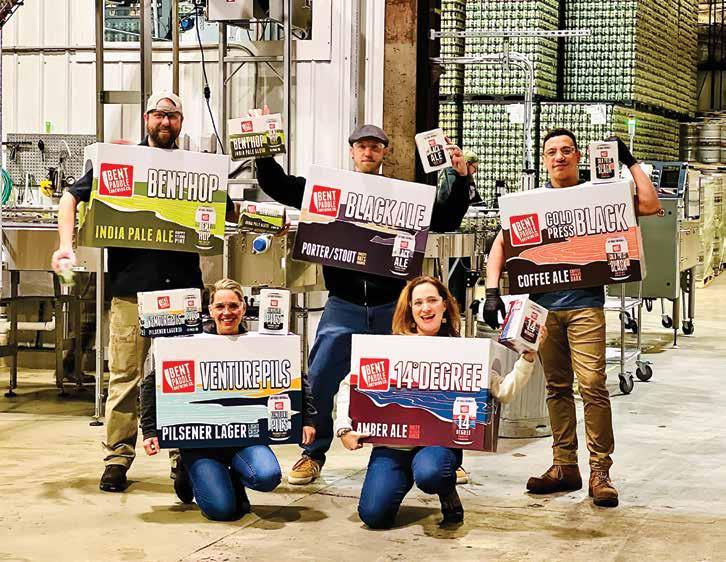
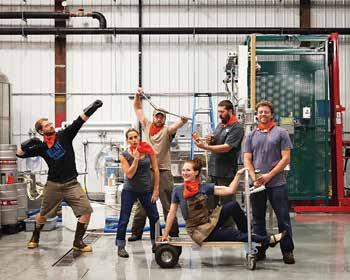
“That helped us set new goals and made sure everyone was still in the right seat,” Mullen said. “It was about strong, honest communication and accountability.”
Mullen had been blazing a trail in craft brewing in Minnesota for years. In 2015, she served as the first female president of the Minnesota Craft Brewers Guild, and was just the second woman to serve on the guild’s board. She helped launch All Pints North, the annual craft beverage tasting showcase in Duluth that will celebrate its 12th anniversary this summer. Mullen produced this and several other craft brewing events for several years.
“We made All Pints North happen, and we set the stage for it to continue into the future,” Mullen said.
Today, Bent Paddle emphasizes building local community, such as with their “Paddle It Forward” program. That’s how Bent Paddle gives back to the community by donating products and venue space, totaling more than $650,000 to more than 600 community organizations since Bent Paddle opened.
“The guys would have done it,” Mullen said, “but not like we
Bent Paddle Co. co-owners Karen Tonnis, lower left, and Laura Mullen, lower right, are pictured after a Bent Paddle rebranding.
20
Plenty of solid business decisions, as well as a few fun shenanigans, ensued when the Tonnis and Mullen families were building Bent Paddle Brewing Co., which opened in 2013.
40 March 2024
Part of what differentiates Bent Paddle Brewing Co. is the "Paddle it Forward" community program, said Karen Tonnis and Laura Mullen. Here, the team participates in an event benefiting Chester Bowl park in Duluth.
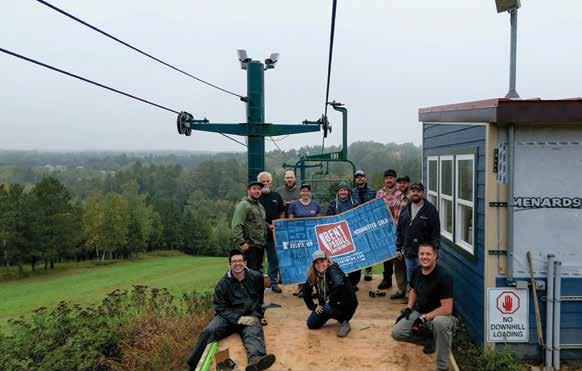
have. It’s become a huge part of our differentiation.”
“Our guys are so awesome, they work so hard,” Tonnis said. “But there’s a different warmth that we bring. We are the bow on top.”
The team at Bent Paddle is working not just to lift up women in the brewing industry, but also to support other regional brewers. In Duluth’s Lincoln Park Craft District, there are several craft breweries within walking distance of each other. Mullen sees that as an opportunity for “coopetition,” as she describes it.
Sure, she wants people to visit Bent Paddle. But she also knows craft beverage enthusiasts are drawn to Duluth to spend a day sampling beverages at Ursa Minor, Duluth Cider, Bent Paddle and others.
Truly supporting local craft businesses means “choosing
fewer things, but of higher quality,” Mullen said.
“The consistency sustains us,” Tonnis said.
It’s also important to keep on top of the prevailing trends in beer consumption. It’s no longer enough just to produce quality craft beer. Today, people are interested in cannabisinfused beverages, and more people are sober-curious, Tonnis said. Bent Paddle responded by opening the Cann-A-Lounge, located in their original taproom, where adults can try a Bent Paddle-brewed cannabis sparkling drink in a funky atmosphere. Bent Paddle also now brews a nonalcoholic hop water.
As Tonnis points out, “We’re really good at putting carbonated beverages in cans.” ✤
Janna Goerdt is an Iron Range farmer and freelance writer.





THEWOMANTODAY.COM 41 Dr. Nathan A. Jarnot 303 S.E. First Street and River Road, Grand Rapids, MN 55744 • 218.326.0349 Dr. Nathan A. Jarnot • Dr. Eric Scotland, DDS • Dr. Scott K. Varland • Dr. Paul K. Hodapp • Dr. Scott K. Varland • Dr. Nathan A. Jarnot 303 S.E. First Street and River Road, Grand Rapids, MN 55744 • 218.326.0349 Your Oral & Maxillofacial Surgeons and their team are ready to assist you in making the best decisions for a healthy mouth and lasting smile. We have a wide scope practice to offer, including: •Dental Implants •Wisdom Teeth Extraction •Corrective Jaw Surgery •Financing Available/CareCredit Serving the area since 1969
k i d skorner
By Ali Carlson

Our family is LOVING this warmer weather. It means more time spent outside enjoying our community. If it were up to Sloane we would never come inside!
Please remember to take the time to visit all of the wonderful businesses in our area with your families :)
Sloane’s recent favorite saying:
“Let’s go on an adventure!”
Summer Camp registration opens March 15
It’s time to plan for summer! Summer day camps meet on-site and use the Aquarium exhibits, grounds, and community parks to learn about our natural world. Join us for a summer of caring for animals, celebrating Lake Superior, SCUBA diving, and more! Find the full schedule and register early at www.glaquarium.org.

At the Depot

Museum exhibits
Educational programming. Family events. The St. Louis County Depot is a welcoming space for all. Follow us on social media or visit our website to find all there is to experience inside this wonderous building. ExperienceTheDepot.org or “St. Louis Count Depot” on Facebook & Instagram.



42 March 2024
SLOanE’s Suggestions
At the Aquarium Let’s Skate FRIDAY 5:00-8:00 pm* Super Glow Skate Party! *Free light stick with each paid admission!! 8:30-11:00 pm Adult Night Ages 18+ Only! College Rate With ID $8.99 + Rental $9.95 + Rental $8.95 + Rental Fun For All Ages!
THEWOMANTODAY.COM 43
Brought to you by:

RADIANT SKIN:
DIY sugar scrub for you or a loved one
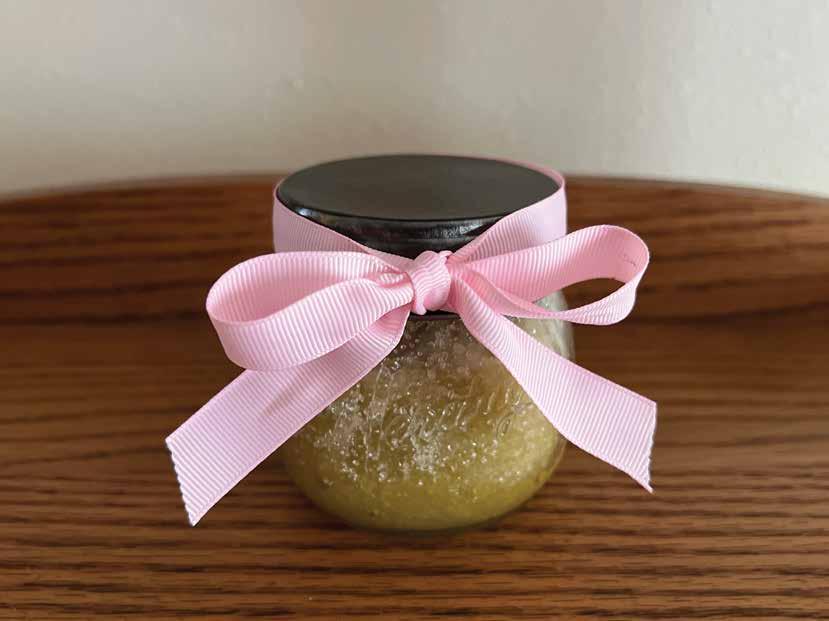
DIY
PHOTOS BY MOLLY MILROY
By Molly Milroy
Irecently received a fantastic homemade sugar scrub from a friend, and as someone who typically keeps her bath routine minimal with just a bar of Dove soap, I was surprised by how frequently I found myself reaching for this delightful concoction. So much so that when my supply ran out, I decided to create my own. Enjoy the benefits of smooth, radiant skin with this easy-to-make sugar scrub.
Unlocking the benefits of sugar scrubs
There are numerous benefits to incorporating a sugar scrub into your skin care routine. The main advantage is that it is a fantastic way to exfoliate the skin, sloughing off dead cells and paving the way for new ones to grow. Exfoliating softens the skin and can leave it feeling refreshed and looking vibrant. It’s perfect for those who have sensitive skin, as it can leave your skin feeling incredibly smooth and rejuvenated. However, only use the scrub once or twice a week, as over-exfoliation can be harsh on the skin and may cause irritation.
When applying the sugar scrub, pay extra attention and spend more time on areas prone to dryness, such as elbows and heels. Take care when using it in the shower, as it may create a slippery surface. Top off your bath routine with a luxurious lotion to enhance the overall experience.
Crafting your own sugar scrub
This DIY project is super simple and can be whipped up in just a few minutes. Here’s what you’ll need:
• Granulated sugar
• Oil (almond, coconut, grapeseed, or olive)
• Essential oil
• Mixing bowl
• Jar Ingredients:
• 1½ cups of sugar
• ½ cup of oil
• Multiple drops of essential oil
Start by combining 1½ cups of granulated sugar with ½ cup of oil in a mixing bowl. Stir thoroughly to ensure the oil saturates the sugar. Next, add 5-7 drops of your chosen essential oil. I personally love the scent of lavender, but lilac or rose are great alternatives. Next, stir the essential oil and scoop the mixture into a jar. Add a few more drops of essential oil on top for an extra touch before sealing the jar tightly.
A ritual of refreshment
Sugar scrubs work wonders for the body. Incorporate this delightful ritual into your routine once or twice a week and leave each bath with an overwhelming sense of rejuvenation. Consider pairing this DIY creation with a loofah or sponge for a thoughtful and personalized gift. Embrace this weekly routine to create smooth, radiant skin with this effortlessly crafted sugar scrub. ✤
Molly Milroy is a Duluth freelance writer.
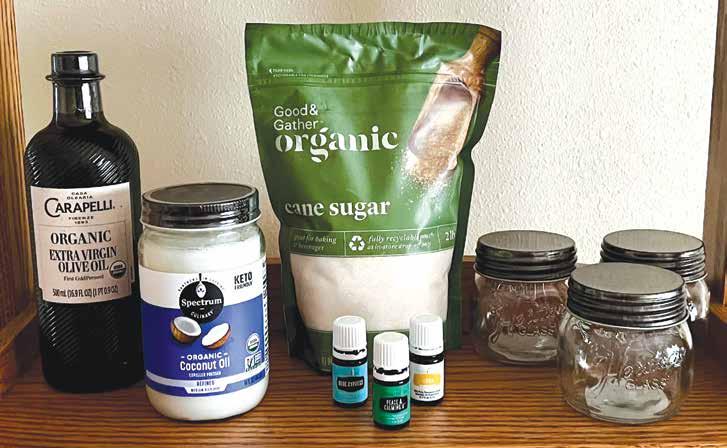

THEWOMANTODAY.COM 45
SavorySoups
with Crunchy Toppers
 By Kim Quinones
By Kim Quinones
PHOTOS COURTESY OF KIM QUINONES
The Woman Today
GINGER SALMON SOUP with ROASTED VEGETABLES
ROASTED VEGETABLES
4 medium Tomatoes, cut in half
1 small Butternut squash, peeled and diced large
3 small Onions, peeled and left whole
5 small Sweet peppers, tops sliced off
3 heads Garlic, slice off large end to expose garlic heads, drizzled with olive oil and wrap with foil.
3 Tbsp. Olive oil
Salt and pepper to taste
OVEN PREP FOR ROASTED VEGETABLES
Preheat the oven to 425 degrees.
Line a large sheet pan with aluminum foil.
Prepare tomatoes, butternut squash, onions, sweet peppers and garlic.
Arrange on a cookie sheet.
Coat vegetables with 3 Tbsp olive oil. Season with salt and pepper. Place seasoned and foil-wrapped garlic on the same sheet pan.
Roast for 20-30 minutes. Set aside veggies and 1 head of garlic for the soup. Save two heads of garlic to make Garlic Parmesan Croutons recipe.
SOUP
1 pound Salmon filet, cut into 2-3 portions
2 Tbsp. Olive oil
1 medium Leek, sliced
1 medium Sweet potato, peeled and diced large Roasted vegetables (from above)
32 oz. Vegetable broth
2 Tbsp. Pureed ginger (available near fresh herbs in produce section) or finely grated fresh ginger
1 tsp. Garlic powder
1 Tbsp. Butter
Salt and pepper to taste


STOVETOP PREP
Heat 2 Tbsp. olive oil in a Dutch oven pot over medium-high heat. Saute leek and sweet potato. Push to the side of the pot to open a space to brown the salmon filet. Add salmon, skin side up. Once the fish is browned, remove skin and discard. Return salmon to the pot. Add roasted vegetables. Squeeze roasted garlic from its papery liner into the pot. Add broth, ginger and seasonings and stir. Simmer for 20-30 minutes. Salt and pepper to taste. Finish with 1 Tbsp. butter.
Serve topped with Parmesan Crisps and Garlic Parmesan Croutons.



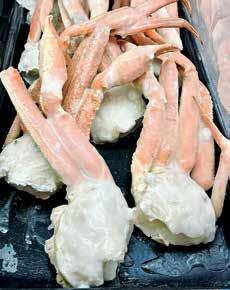

THEWOMANTODAY.COM 47
Best variety of fresh fish and seafood in the Northland! 1600 Woodland Ave., Duluth Open 6 a.m.-10 p.m | 7 days a week 218-728-3665 Express Online Shopping www.mountroyalmarket.com
FISH & SEAFOOD
Fresh

CHICKEN AND POTATO SOUP
1 pound Ground chicken
1 Tbsp. Olive oil
3 medium Potatoes, russet or red, diced large
1 medium Onion, chopped
3 medium Carrots, sliced into 1/4'' rounds, then cut in half
1 stalk Celery, chopped
8 oz. White button or cremini mushrooms, sliced in half
1 tsp. Thyme
1 tsp. Garlic powder
32 oz. Chicken broth
1 cups Water
1/3 cup Green peas, frozen 1/4 cup Cream
1 Tbsp. Butter
Salt and pepper to taste
In a Dutch oven pot, brown ground chicken in 1 Tbsp. olive oil over medium heat. Add potatoes and onion and saute until onions are translucent. Add carrots, celery, mushrooms, thyme and garlic powder and continue cooking for another 3 minutes. Pour in broth and water and simmer for 20 minutes. Stir in peas, cream and season with salt and pepper to taste. Finish with 1 Tbsp. butter.
Serve topped with Garlic Parmesan Croutons.

PINTO BEANS WITH HAM
1 pound Dried pinto beans, prep outlined below 1 medium White onion, chopped Olive oil
1 leftover Ham bone with meat, smoked ham hock or smoked turkey leg
Salt and pepper to taste
1 can Diced tomatoes with green chiles, optional
Prep beans by quick pre-soak method: Sort beans by arranging on a sheet pan and remove any debris, broken or shriveled beans.
In a Dutch oven, place 1 pound dry beans and add enough water to cover the beans.
Bring to a rolling boil for 2 minutes. Remove from heat.
Place a lid on the pot and let it stand for 1 hour.
Rinse beans, drain and set aside in a bowl.
Wash out the Dutch oven pot to use for making the soup.
In a Dutch oven, saute onion in olive oil over medium heat until onion is translucent.
Add prepped beans and ham bone and fill the pot with water leaving 2 inches of room at the top of the pot. The top of the ham can remain above water.
Add 1 tsp. each salt and pepper.
Bring to a boil, then turn down the heat. Add optional tomatoes with chiles. Cover and simmer on low for 2 to 2.5 hours, checking water level each hour to make sure the beans don’t cook dry. Or, if you prefer, place the covered pot into a 350-degree oven for one hour, check water level, turn down the heat to 300 and cook for another 1 to 1.5 hours.
Pull the ham off the bone and into the soup and discard the bone.
Season with salt and pepper to taste.
Serve topped with Garlic Parmesan Croutons.
48 March 2024
SOUP TOPPERS
Parmesan Crisps
Preheat the oven to 270 degrees.
Sprinkle a lacey mound of freshly grated parmesan cheese on a parchment paper-lined sheet pan.
Bake for 6-10 minutes until lightly browned.
Remove from the oven. Can roll the cheese crisp right away or let them cool flat.
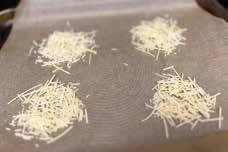
Garlic Parmesan Croutons
Cut a crusty loaf of bread into large crouton size cubes.
Mash fresh roasted garlic with 3 Tbsp. olive oil, 1 tsp. garlic powder, and 1 tsp. each salt and pepper in a glass bowl. Add bread cubes and toss until evenly coated.
Arrange bread cubes on a parchment paper-lined sheet pan. Sprinkle with freshly grated parmesan cheese. Bake at 400 degrees for 10-12 minutes until lightly browned.
Remove from the oven and let cool. ✤














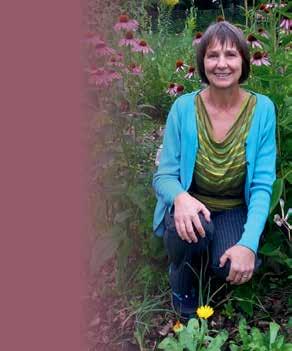
THEWOMANTODAY.COM 49
218.728.0884 wholefoods.coop Ene rgy fo r Li fe Con ne c ti on : ha nd m a d e h e rba l rem ed ie s s uppo r ti ng l o ca l & wo m e n-o w ned bu s i ness e s
The Woman Yesterday

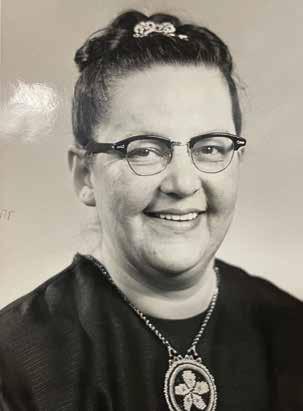
Ruth A. Myers (1926-2001)
By Amy Carlson
Ruth A. Myers never finished high school, but she became known as the “grandmother of American Indian Education in Minnesota.”
Born in Chippewa City, she was an enrolled member of the Grand Portage Band of Lake Superior Chippewa (Ojibwe) and moved to Duluth when she was 2. Myers spent time at a Native American boarding school, speaking little of the experience but using it to inspire positive change, according to MNOpedia. She left school in 11th grade to work in a military airplane factory in Oklahoma during World War II, and then returned to Duluth where she lived with her husband, Millard E. Myers, and their four children.
In the mid-1960s she began working for the American Indian Fellowship Association as its “education person,” and in 1971 was elected to the Duluth School Board. In 1975, she was appointed to the Minnesota State Board of Education and was the only Native member, serving two terms as its chairperson. During her tenure, she encouraged change in how Native Americans were presented in textbooks, library materials and the core curriculum, while also fighting for the preservation of Native American languages in schools and the education of all
Minnesota students about Native cultures.
She joined the UMD education department in 1973, and in 1979 became the co-director of American Indian Programs, currently known as the Center of American Indian & Minority Health at the UMD School of Medicine. While at UMD, she started 16 of 17 programs for Native students. Upon retiring in 1994 she received an honorary Doctor of Humane Letters, Honoris Causa. Then-chancellor Lawrence Ianni noted that Myers “has been the best known and most highly respected spokesperson for the rights of American Indians in Minnesota for almost five decades.” UMD also established the Ruth A. Myers Endowed Chair of American Indian Studies in 1994.
In 1986, she chaired the Fond du Lac Tribal and Community College in Cloquet (FLTCC) task force, helping to establish a permanent campus, and in 1994, the campus library was named the Ruth A. Myers Library.
Myers passed away in November 2001, but her legacy continues. In 2013, Duluth’s newest elementary school, MyersWilkins, was named after Myers and her close friend and fellow education advocate Marjorie Wilkins. ✤
Amy Carlson is a Duluth freelance writer.
50 March 2024
PHOTOS COURTESY OF UNIVERSITY OF MINNESOTA DULUTH, KATHRYN A. MARTIN LIBRARY, NORTHEAST MINNESOTA HISTORICAL COLLECTIONS







Federally insured by NCUA. Membership Eligibility Required. To learn more about MPECU’s Star Tiered Savings Account call us at 218-336-1800 or scan this code here.

 Mother hen and farmer advocate
Lucie Amundsen
Mother hen and farmer advocate
Lucie Amundsen












 Executive Editor, Duluth Media Group
Executive Editor, Duluth Media Group




 By Janna Goerdt
By Janna Goerdt

















 By Noah Beardslee
By Noah Beardslee






























 By Andrea Busche
By Andrea Busche










 By Andrea Busche
By Andrea Busche









 By Anthony Matt
By Anthony Matt




























 By Janna Goerdt
By Janna Goerdt




























 By Kim Quinones
By Kim Quinones
























